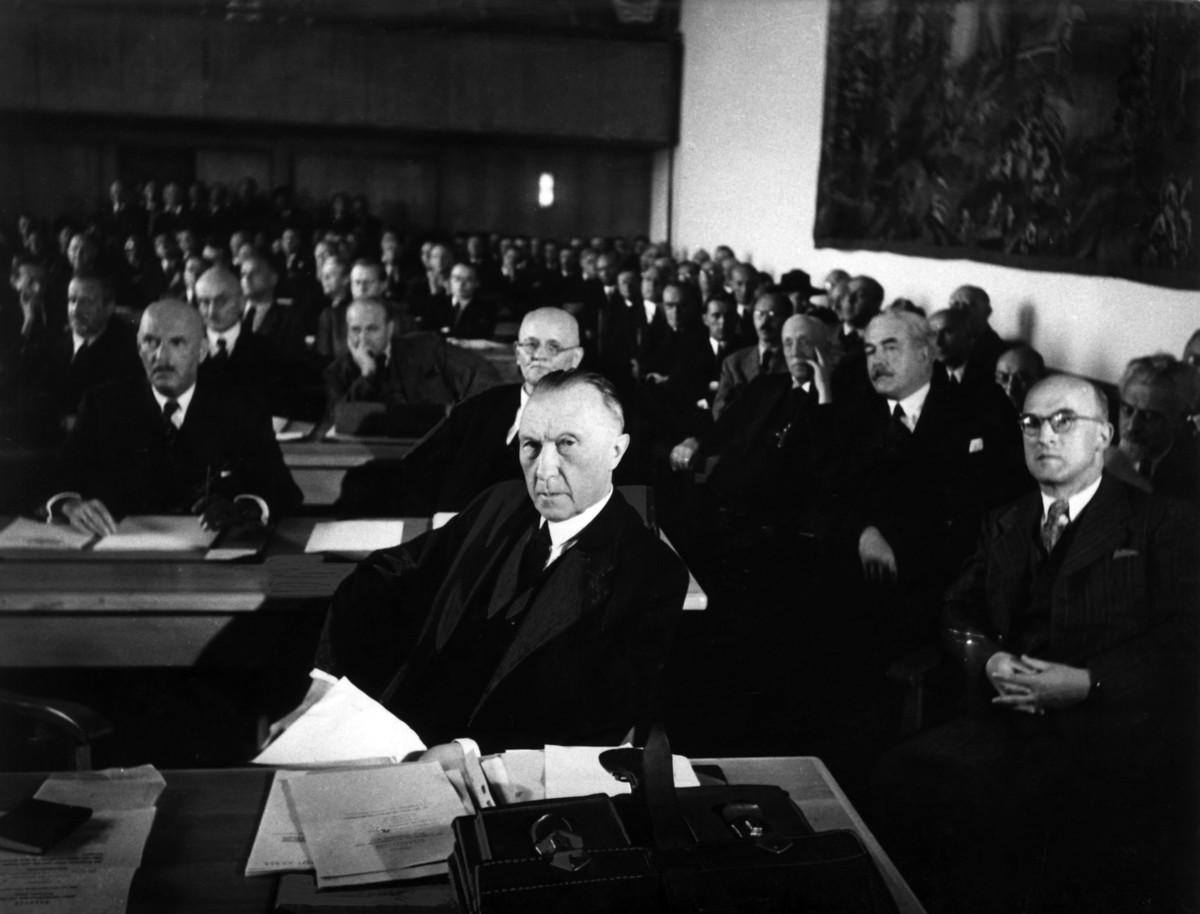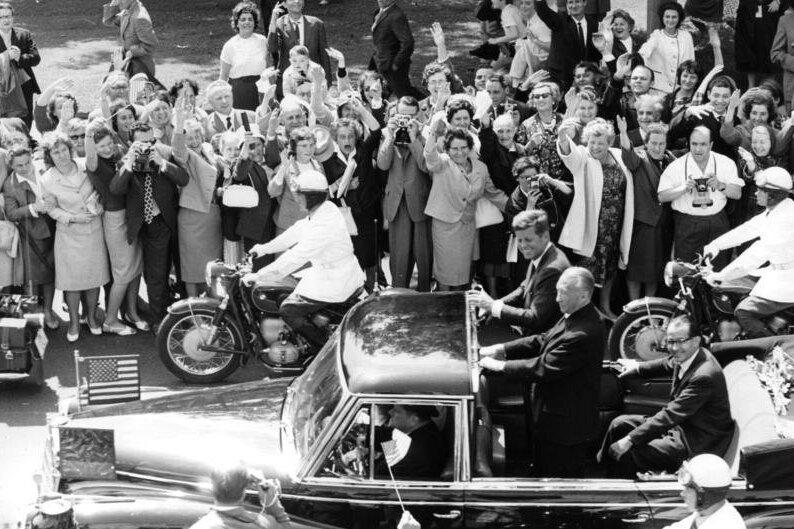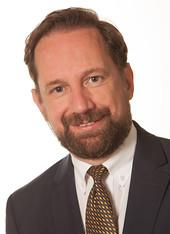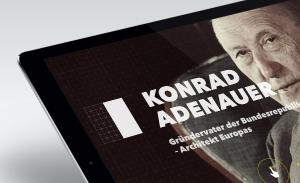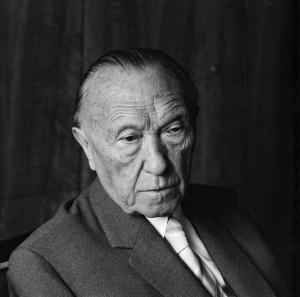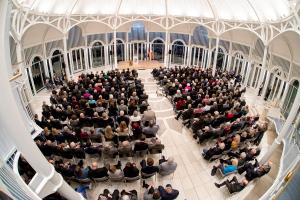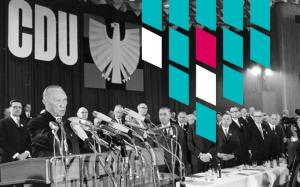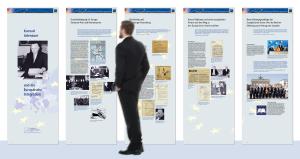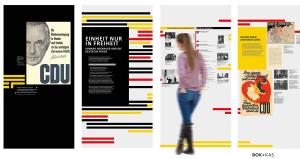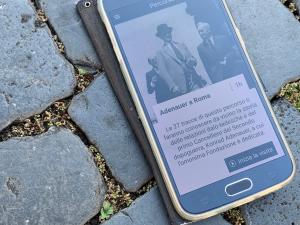Asset Publisher
Konrad Adenauer
* 05. January 1876 - † 19. April 1967
Asset Publisher
Konrad Adenauer: History and Legacy
(Only in German)
YouTube, Onlinekas
Konrad Adenauer was born on 5 January 1876 in Cologne. His father, Konrad, was a civil servant in the middle grade of the civil service. His mother, Helene Scharfenberg, also hailed from a civil servant’s household. With three siblings, two older brothers and a younger sister, he grew up in modest conditions. He attended the humanist Apostelgymnasium in his home town as a “good, unremarkable average” pupil. Following his A-levels in 1894, he started a bank apprenticeship, which he discontinued when awarded a grant by the City of Cologne that enabled him to begin studying law at the University of Freiburg.
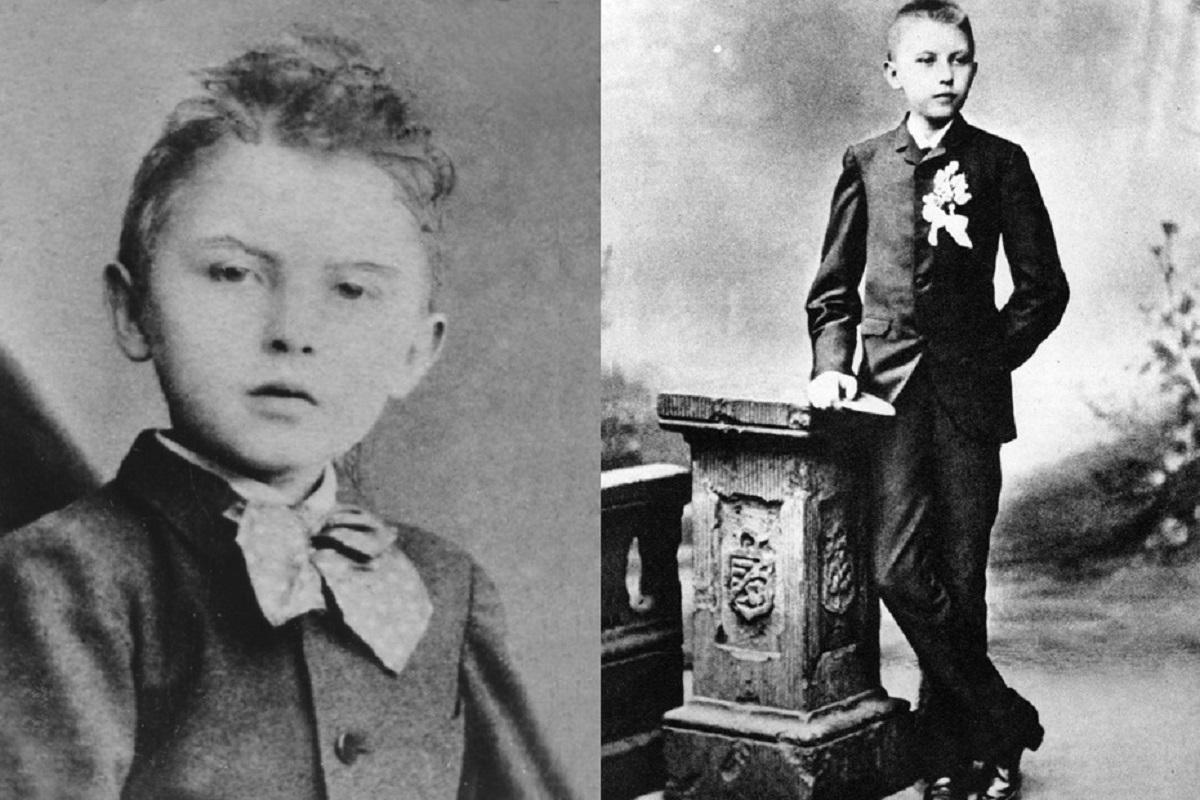 Beide Fotos: StBKAH / Fotograf unbekannt
Beide Fotos: StBKAH / Fotograf unbekannt
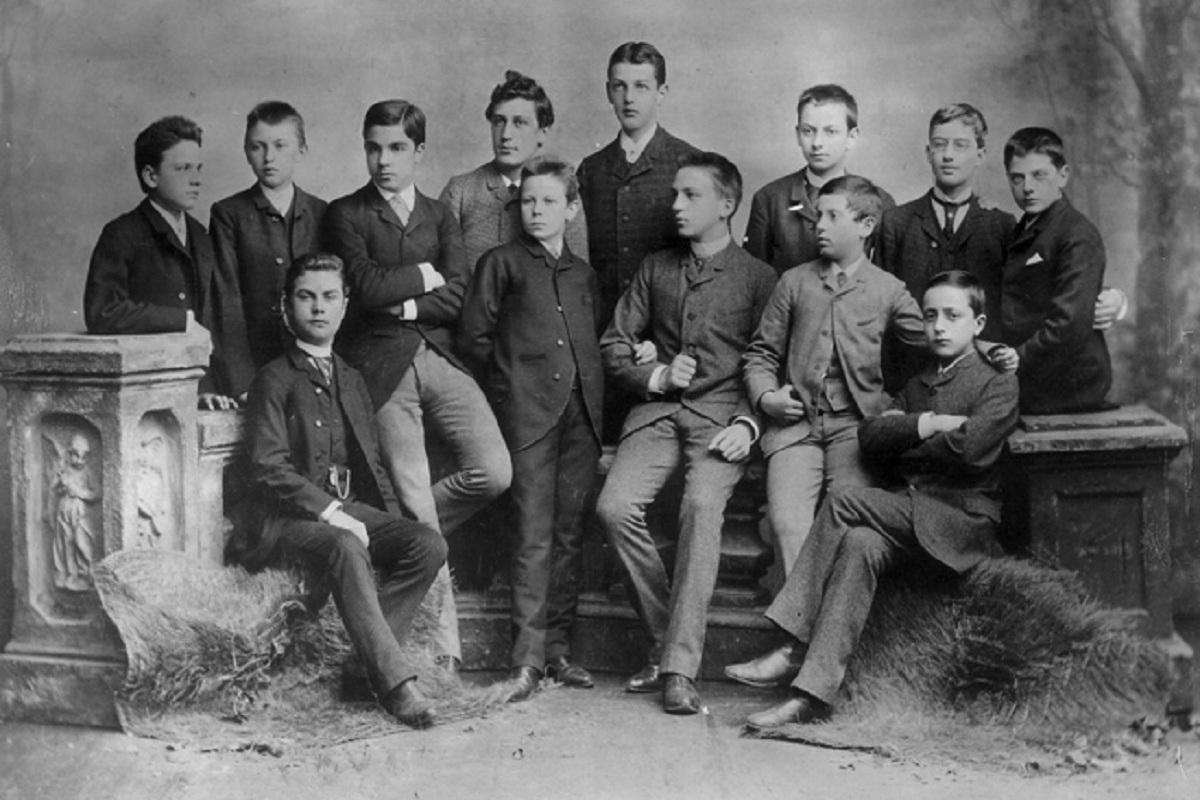 StBKAH / Fotograf unbekannt
StBKAH / Fotograf unbekannt
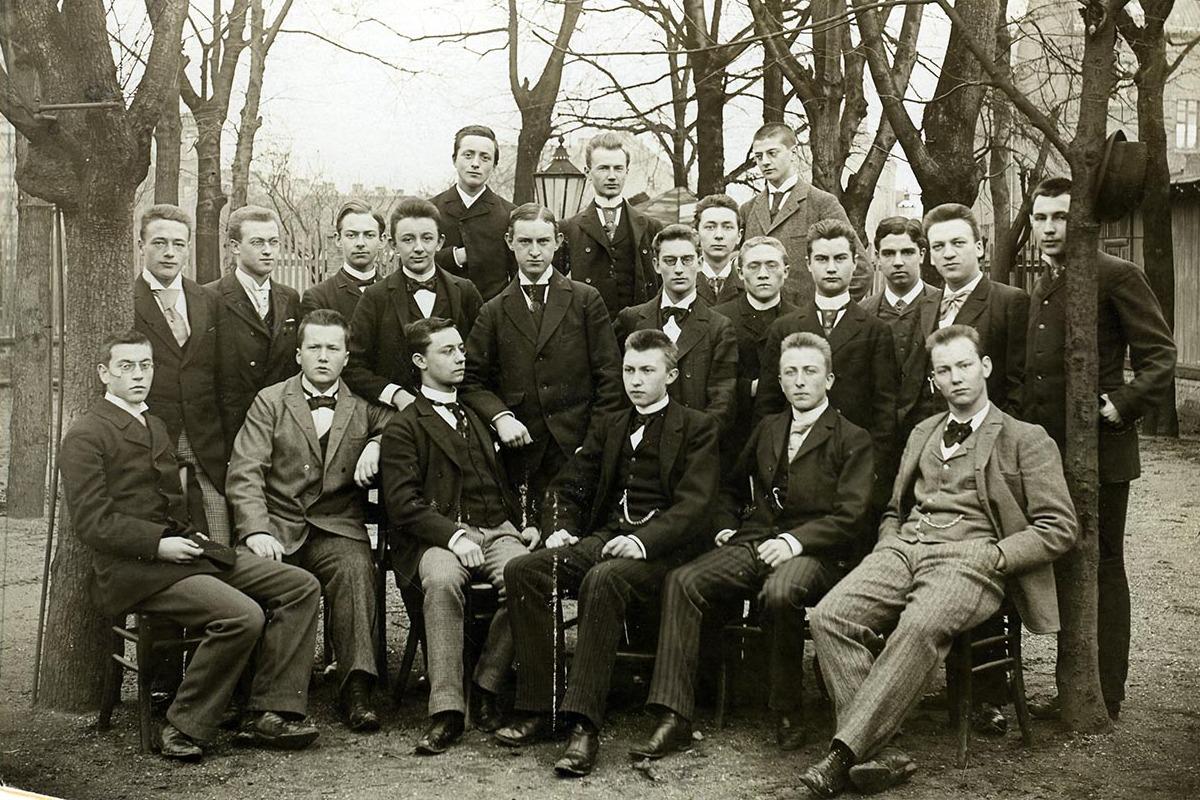 StBKAH / Fotograf unbekannt
StBKAH / Fotograf unbekannt
 Beide Fotos: StBKAH / Fotograf unbekannt
Beide Fotos: StBKAH / Fotograf unbekannt
 StBKAH / Fotograf unbekannt
StBKAH / Fotograf unbekannt
 StBKAH / Fotograf unbekannt
StBKAH / Fotograf unbekannt



After two semesters in Munich, where he also read economics, he went to Bonn. There, he successfully completed the First State Examination in Law in 1897. He passed the Second State Examination in Berlin with “sufficient” in 1901. Following his time as an examining magistrate at the public prosecutor’s office of the Cologne District Court, he joined the law firm of Hermann Kausen, a Cologne Councillor of Justice and Chairman of the Centre party group on Cologne council, in 1902.
Start of a Political Career
It was clear that the background and education of the Catholic Adenauer from the Rhineland would lead him to the centre, the party of political Catholicism. His political career began after he had married the 24-year-old Emma Weyer, the daughter of an esteemed and affluent Cologne family, in 1904.
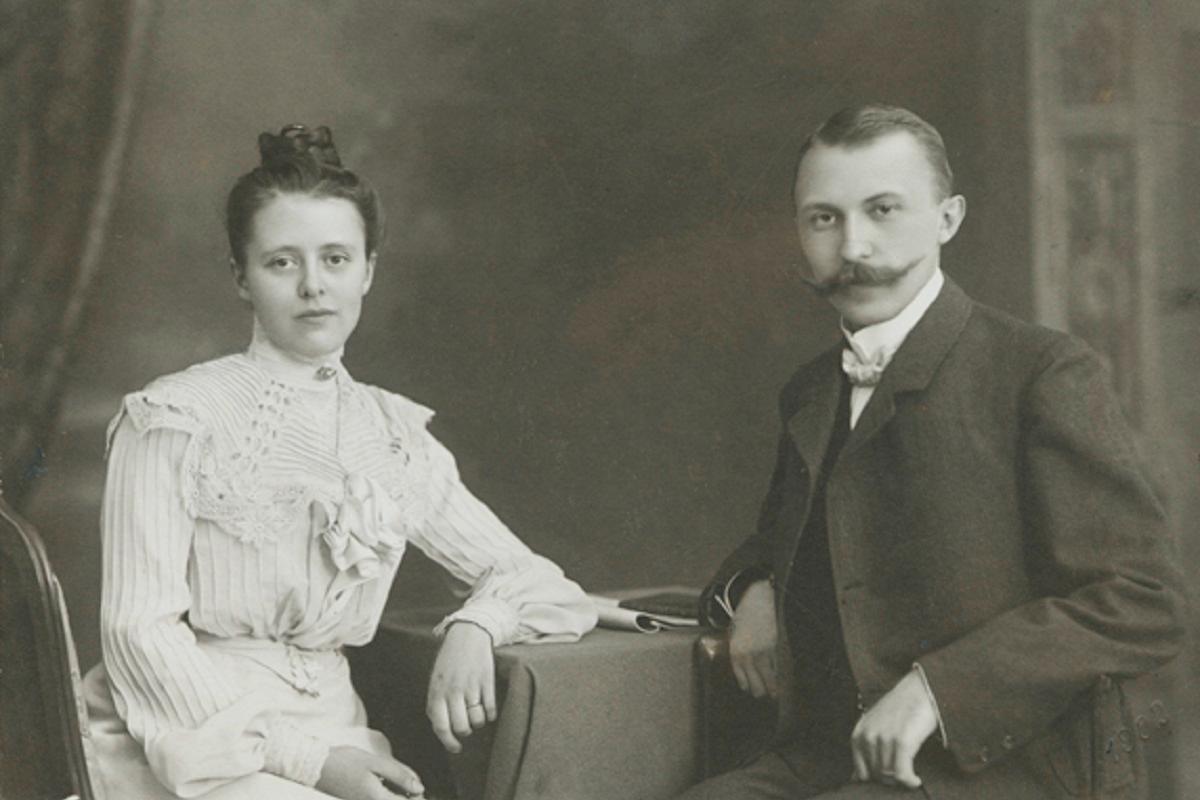 StBKAH / Fotograf: Heinrich Eiländer
StBKAH / Fotograf: Heinrich Eiländer
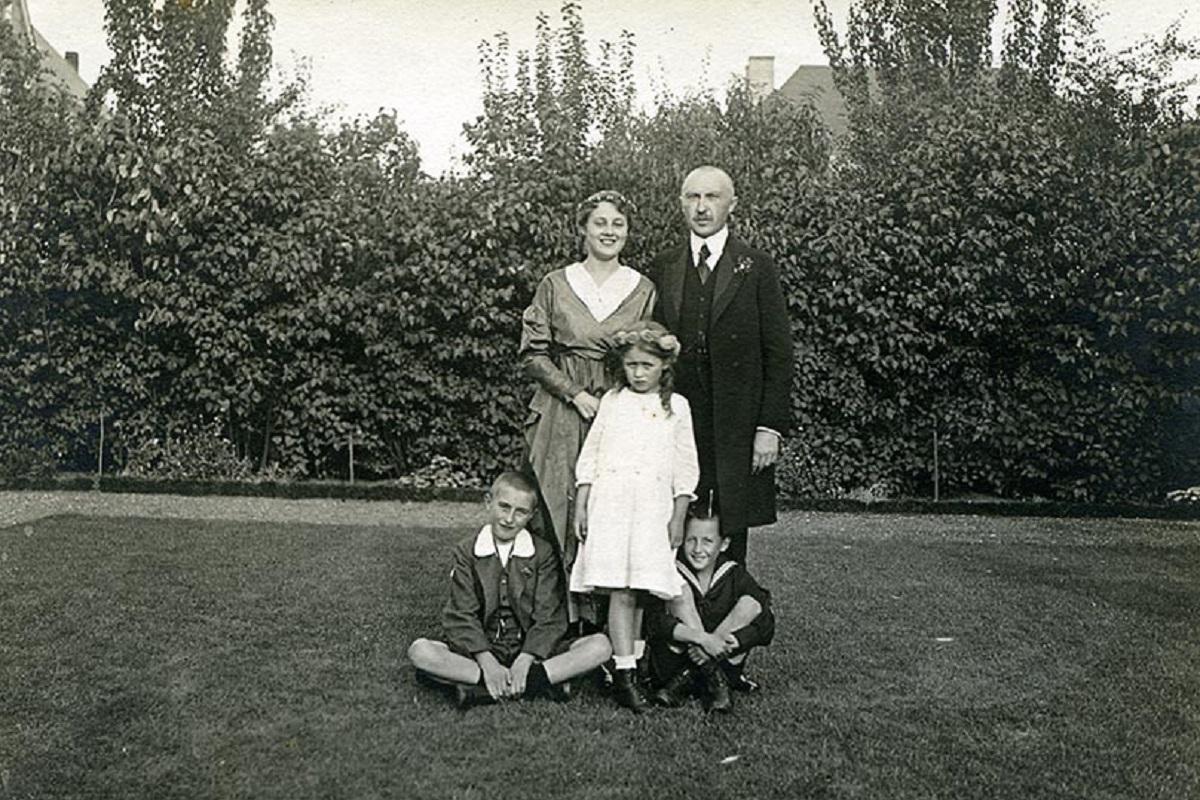 StBKAH
StBKAH
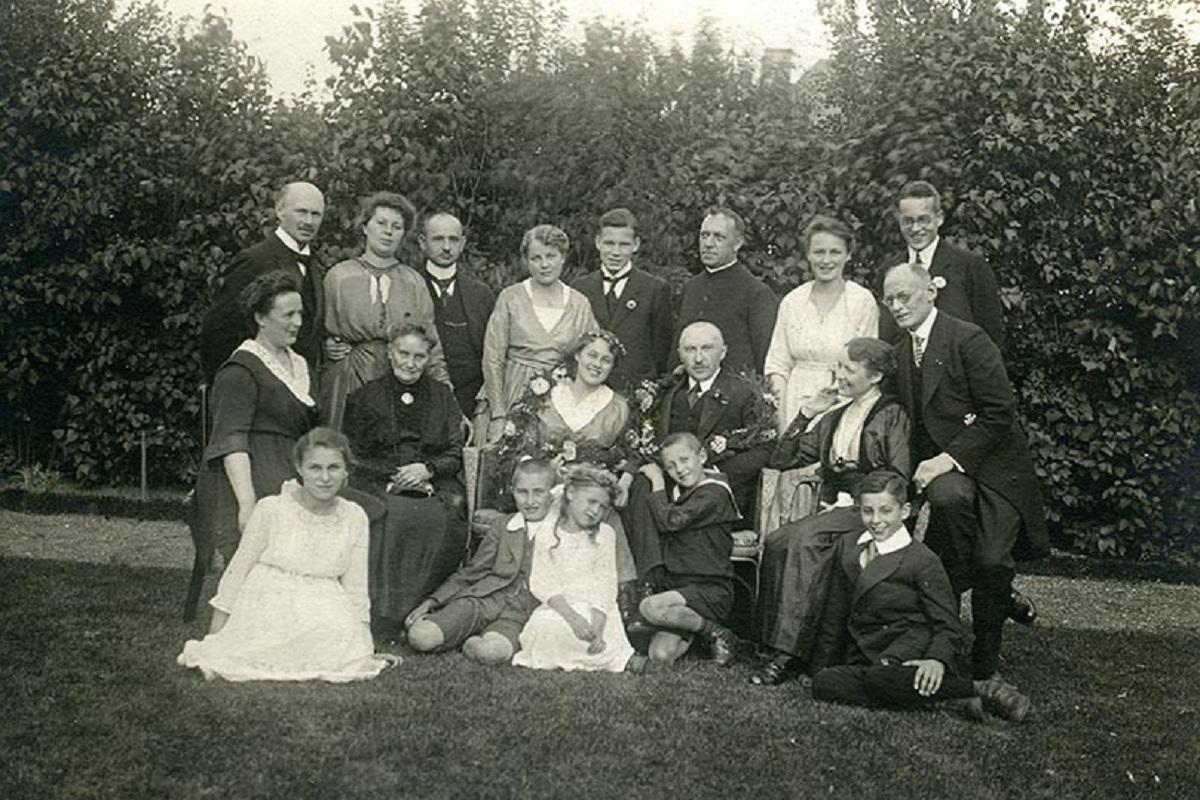 StBKAH
StBKAH
 StBKAH / Fotograf: Heinrich Eiländer
StBKAH / Fotograf: Heinrich Eiländer
 StBKAH
StBKAH
 StBKAH
StBKAH



This marriage brought him into contact with the strongest social and political voices among the Rhenisch bourgeoisie. In 1906 he successfully applied for a role of a full-time Alderman of the city. Three years later, the election as First Alderman made him Deputy to the Lord Mayor, Max Wallraf, the uncle of this wife.
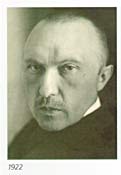
With skill and resourcefulness, Adenauer proved his worth in this office, particularly during the First World War as Organiser of Cologne’s food supply. His professional success was countered by blows of fate in his personal life. In 1916 his wife died, who had borne him three children. He then suffered facial injuries from a serious car accident, after which he had to spend many months in hospital and rehabilitation.
Lord Mayor of Cologne
When Wallraf left for Berlin in 1917 to become Under-Secretary of State for Interior Affairs, the office of Lord Mayor of Cologne became vacant. The city councillors unanimously voted for Adenauer as his successor. This made him the youngest municipal leader in Prussia. During the Weimar Republic, Adenauer was one of the strongest political figures in Germany.
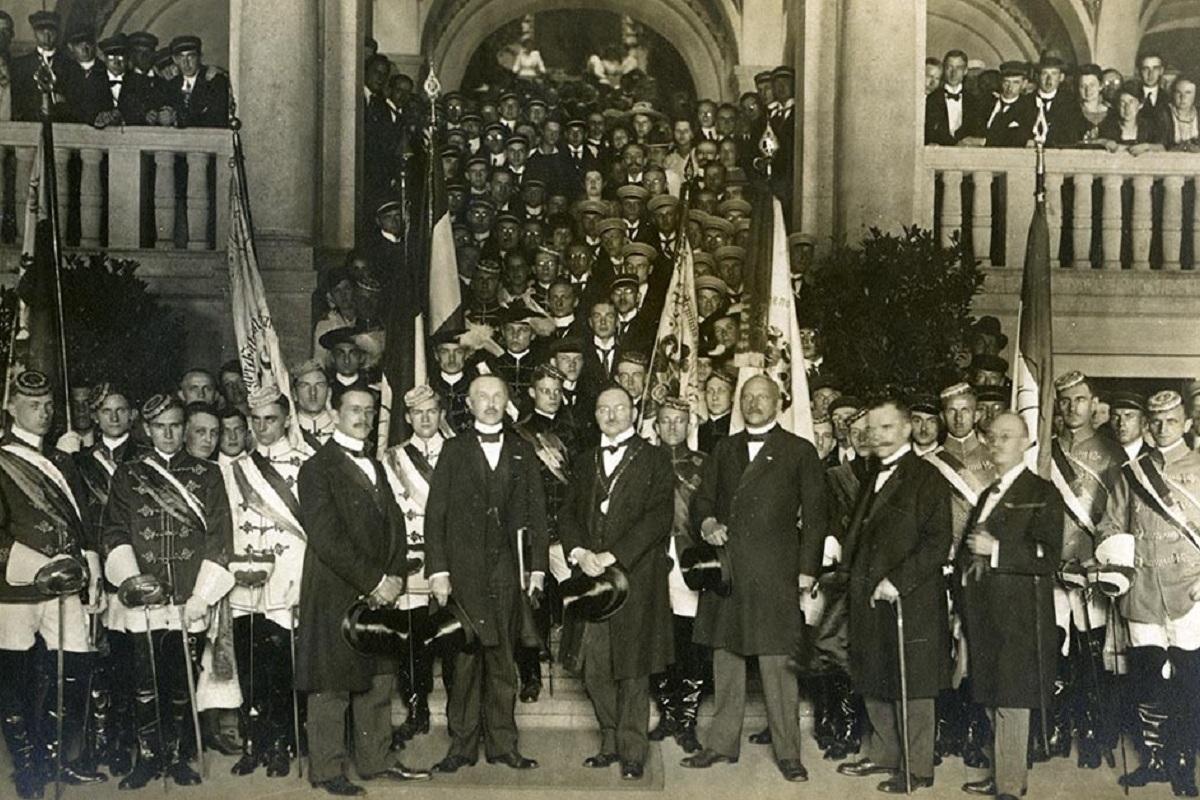 StBKAH / Fotograf: Albert Capell
StBKAH / Fotograf: Albert Capell
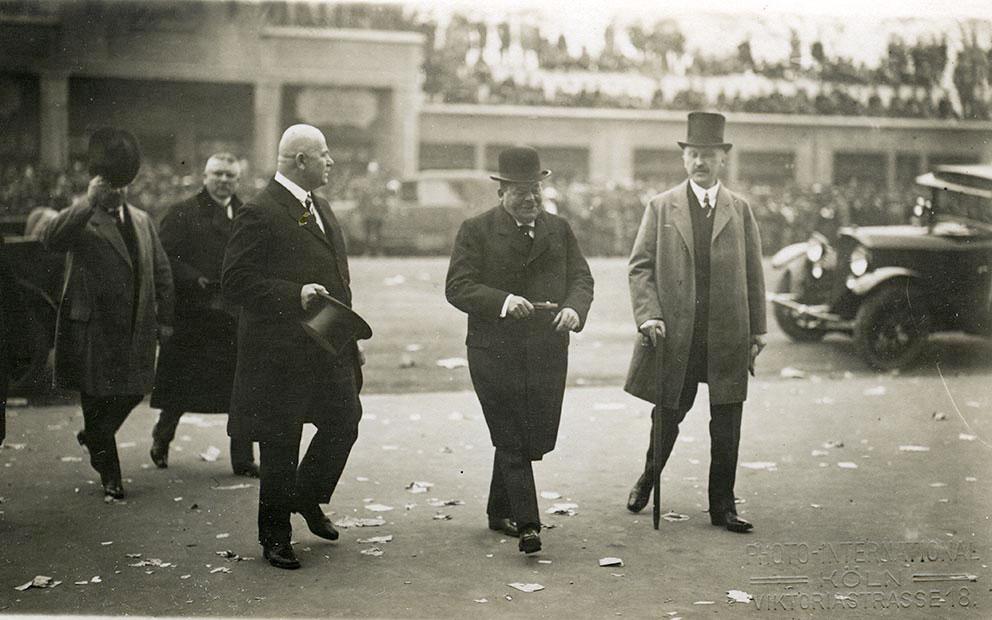 Photo International, Köln/StBKAH
Photo International, Köln/StBKAH
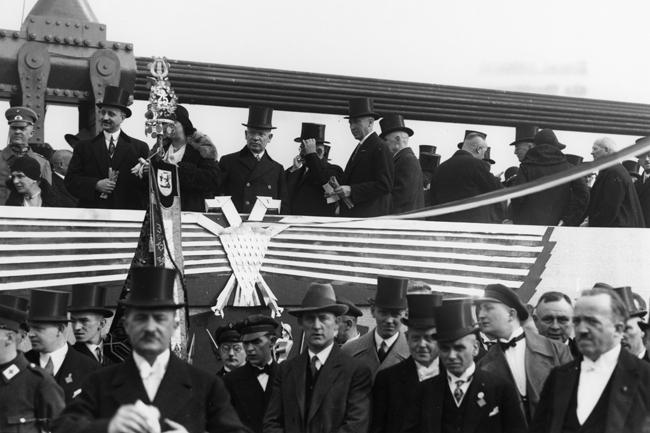 StBKAH / W. Matthäus
StBKAH / W. Matthäus
 StBKAH / Fotograf: Albert Capell
StBKAH / Fotograf: Albert Capell
 Photo International, Köln/StBKAH
Photo International, Köln/StBKAH
 StBKAH / W. Matthäus
StBKAH / W. Matthäus



He made a name for himself with his progressive expansion of Cologne to become “the Metropolis of the West”. The new founding of the university in 1919, the transformation of the former fortification grounds into a green belt, the revival of Cologne Trade Fair, the expansion of the Rhine harbour, the construction of another Rhine bridge, the establishment of industrial companies, including Ford factories, all took place during his term in office.
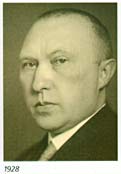
During “great politics”, Adenauer became a key figure in the Rhineland. To prevent the annexation of occupied territories on the left bank of the River Rhine, he temporarily advocated the creation of a Rhineland Federal State so as to appease the French in their security demands. Particularly during the Nazi era, this collaboration in the so-called Rhineland Movement earned him the name of “separatist”.
His influence in the office of President of the Prussian Council of State, which he held from 1921 to 1933, was of national importance. Time and again, he ranked among the potential Chancellor candidates even during government crises under the Weimar Republic.
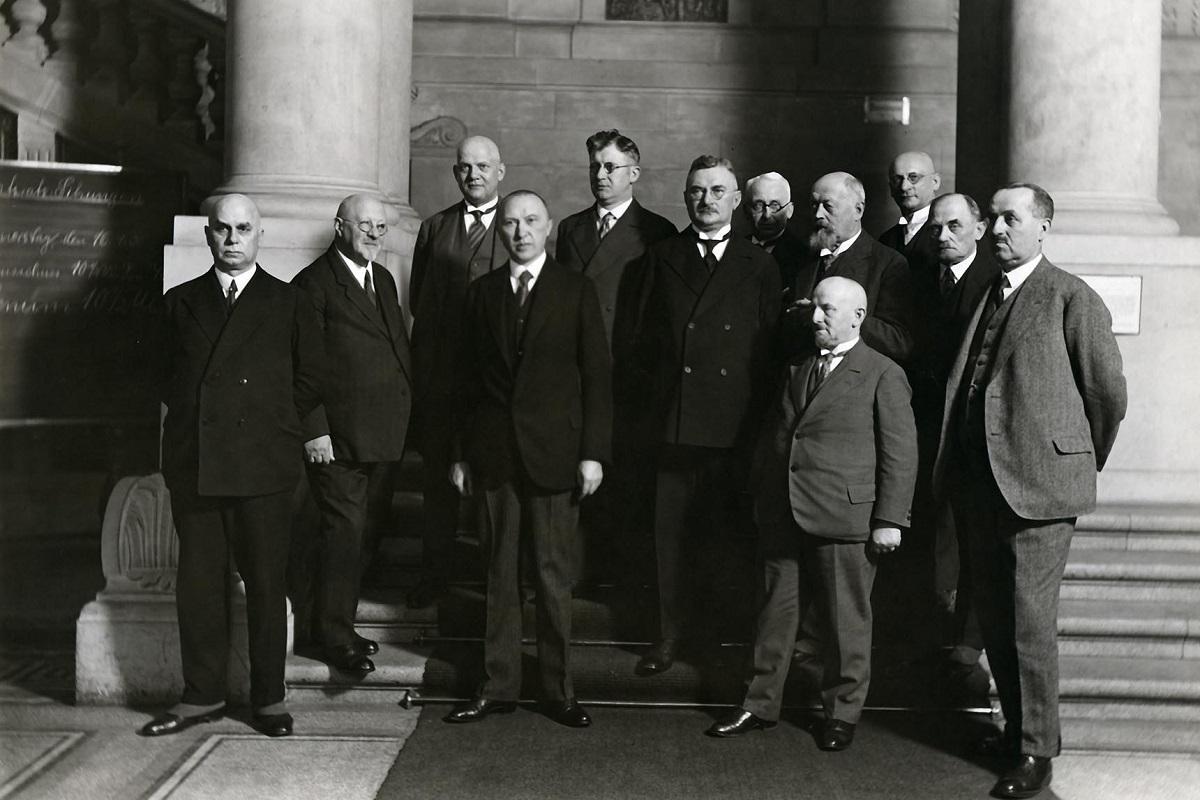 StBKAH / Fotograf unbekannt
StBKAH / Fotograf unbekannt
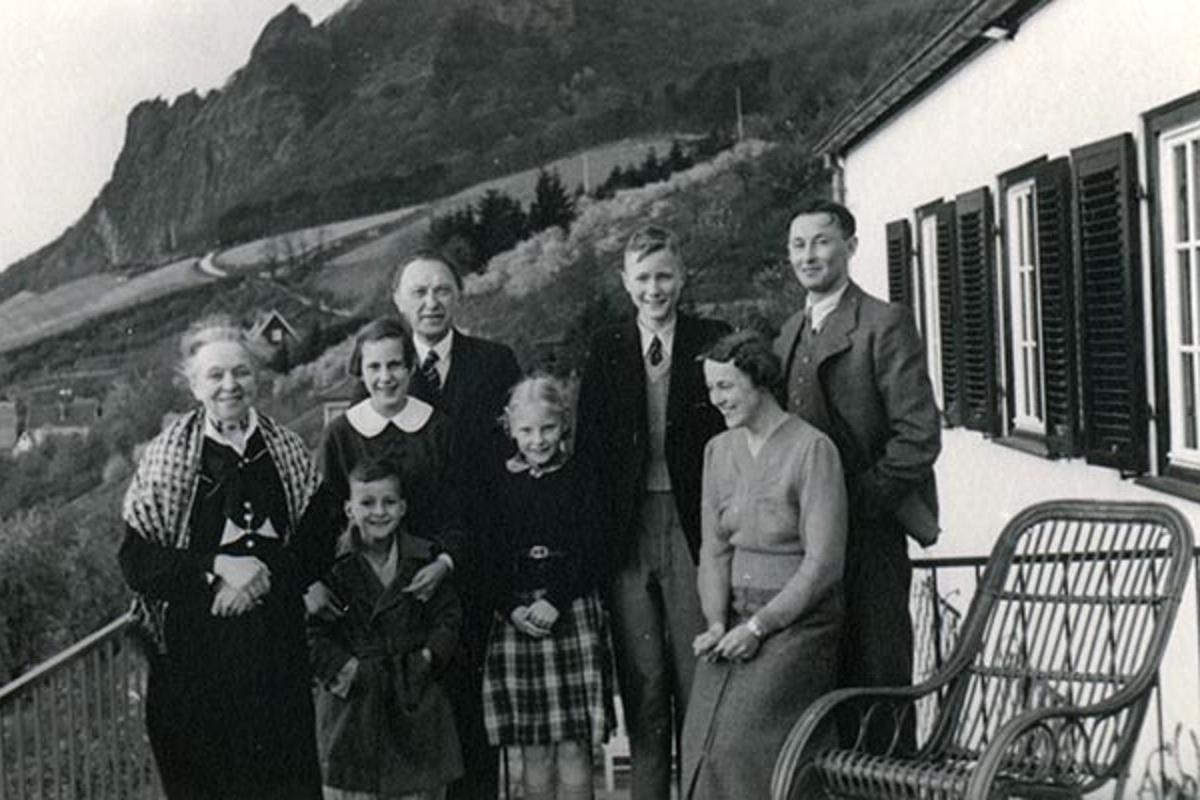 StBKAH
StBKAH
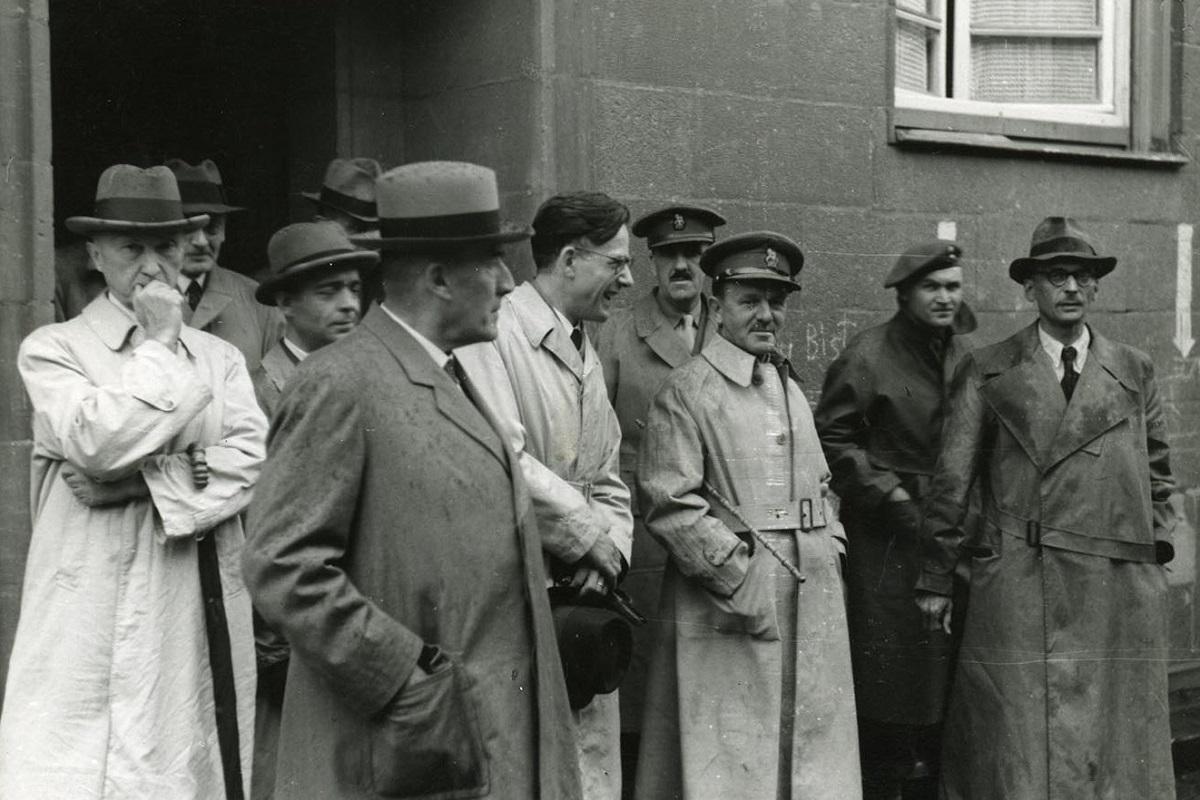 StBKAH / Fotograf unbekannt
StBKAH / Fotograf unbekannt
 StBKAH / Fotograf unbekannt
StBKAH / Fotograf unbekannt
 StBKAH
StBKAH
 StBKAH / Fotograf unbekannt
StBKAH / Fotograf unbekannt



His republicanism, which was affiliated with basic federalist and Christian-social beliefs, made him a hated figure among opponents of the Weimar “system”. When the Nazis formed a government in 1933, he was thus immediately removed from his post as Lord Mayor of Cologne and banned from his home city.
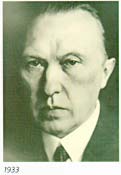
Adenauer survived the years of Nazi tyranny and war with his family in the Rhöndorf Haus on Zennigsweg, which he built after his financial claims settlement with the City of Cologne. Konrad Adenauer found himself in a dangerous situation towards the end of the war, when he was detained in Gestapo custody for several months as a regime opponent following the failed assassination attempt on Hitler on 20 July 1944.
First Chancellor of the Federal Republic of Germany
The American victors made the 69-year-old, who was at the top of a list of untainted politicians, as Lord Mayor of Cologne again. He indefatigably faced his task of bringing new life back to a city that had been severely destroyed. Yet after only a few months, the British military government that was now in power, removed him from office for having criticised their occupation policy.
Adenauer was forced to retire for a second time and was expelled from Cologne. The ban on participating in political activities, issued at the same time, had scarcely been lifted when the now 70-year-old fully immersed himself in his work at the CDU, which he joined shortly after its founding. With political ideas and programme presentations that he had developed after the First World War and tested according to experiences during Nazi rule, he embarked on a “meteoric party-political career”.
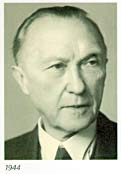
Already by 5 February 1946, Adenauer was elected as Chairman of the Rhineland CDU and – almost one month later – as Chairman of the CDU in the British Zone. In October, he also took over leadership of the CDU parliamentary group in the State Parliament of North Rhine-Westphalia. His rise to become a charismatic founding Chancellor of the Federal Republic of Germany and respected statesman in the Western world was closely linked to the emergence of a confrontation between East and West and the start of the Cold War.
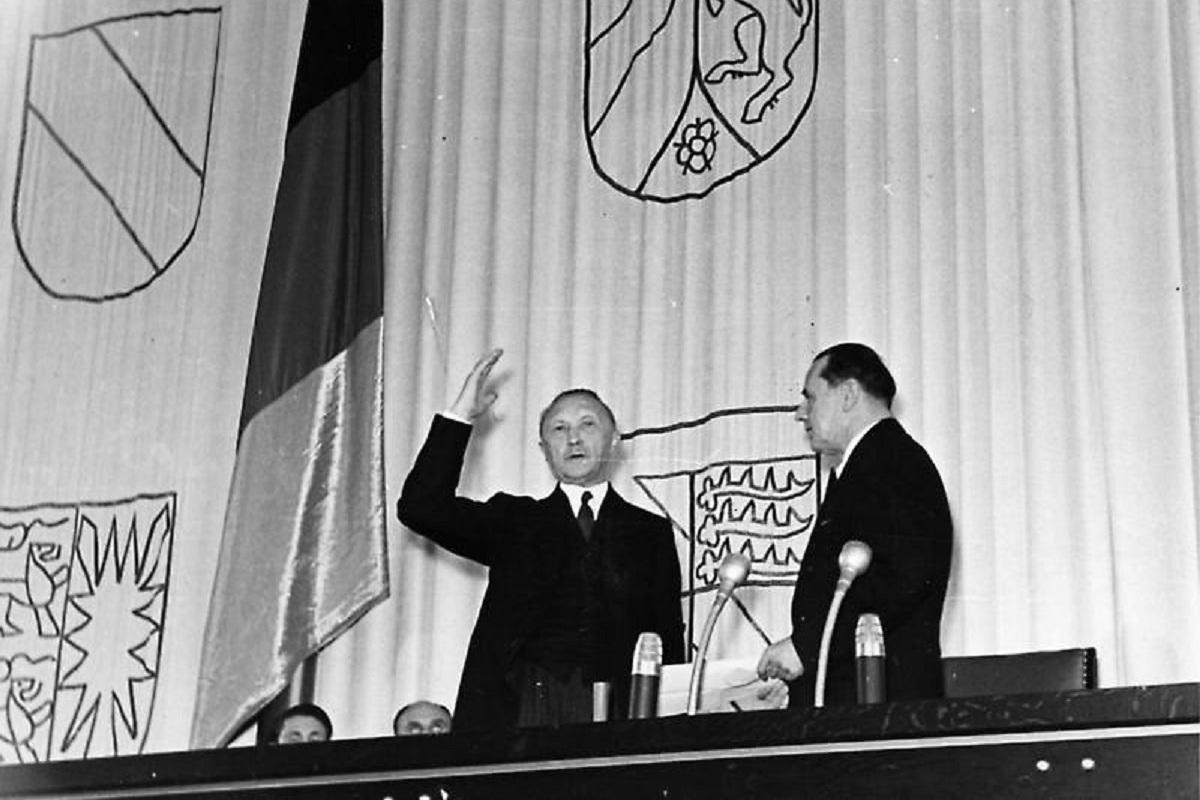 ACDP
ACDP
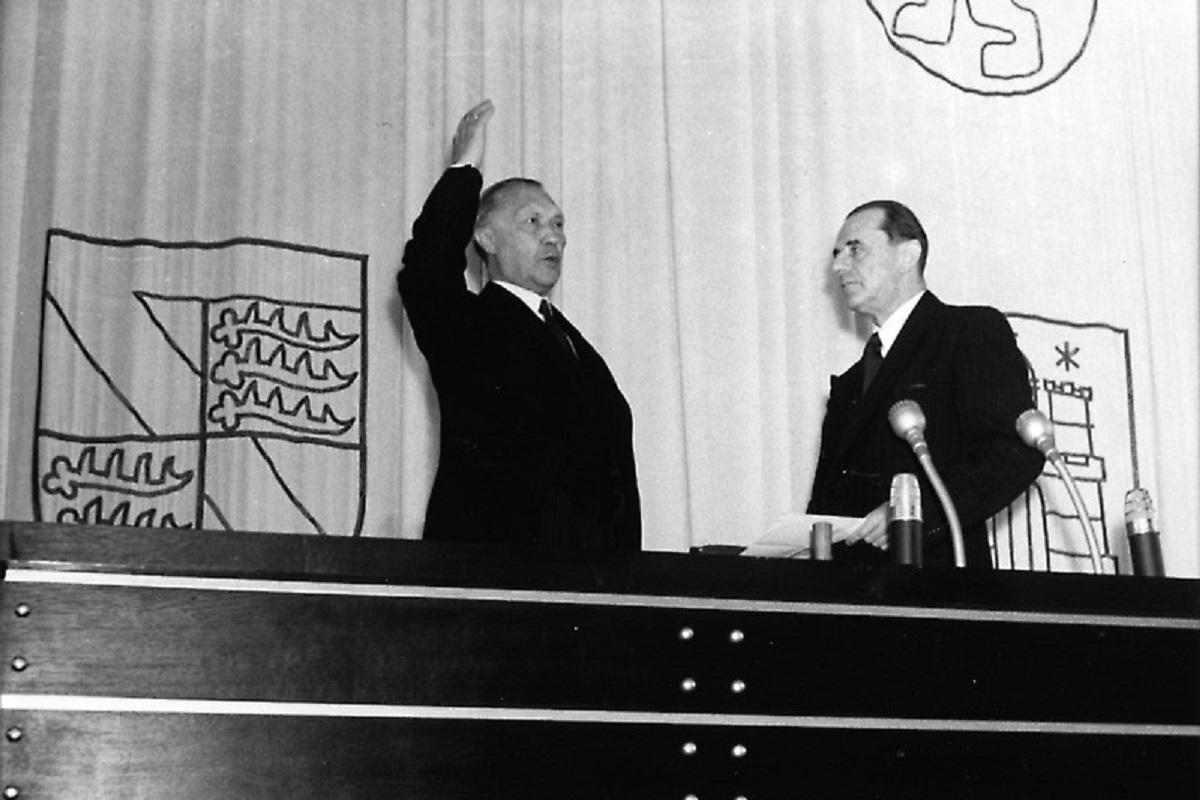 ACDP
ACDP
 ACDP
ACDP
 ACDP
ACDP


The decisive step on his way to leading the emerging West German state was his election as President of the Parliamentary Council, created in 1948 following the order of the three Western Allies to draw up the Basic Law of the Federal Republic of Germany.
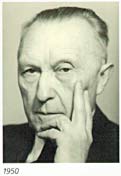
In this position, he became “speaker of the nascent Federal Republic” (Heuss) both before the Minister-Presidents of the Länder and the military governors, and thus gained public respect. On 15 September 1949, the 73-year-old was elected Federal Chancellor by the CDU/CSU parliamentary group of the first German Bundestag. He remained in this position for 14 years.
The Adenauer Era
The governments that he led, laid the foundation for successfully building a new democracy. Actions that defined the epoch are forever connected to the “Adenauer era”: in foreign policy, the achievement of state sovereignty, close ties to the free West, reconciliation with France and European unification, and in domestic policy, the integration of displaced persons and refugees and the expansion of a social market economy as a new kind of economic order, in which the promotion of free competition and the responsibility of the welfare state are interconnected.
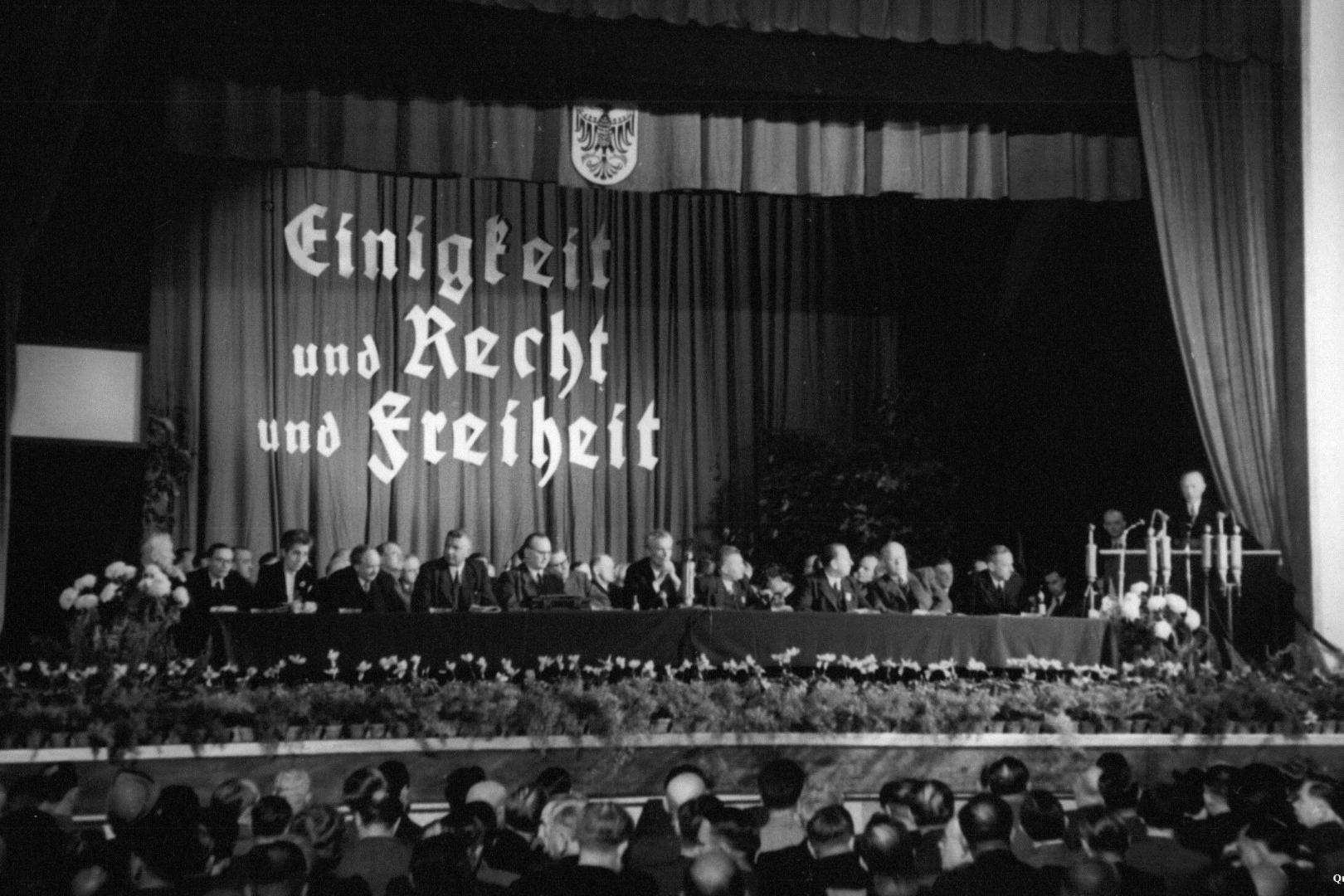 ACDP / www.kas.de
ACDP / www.kas.de
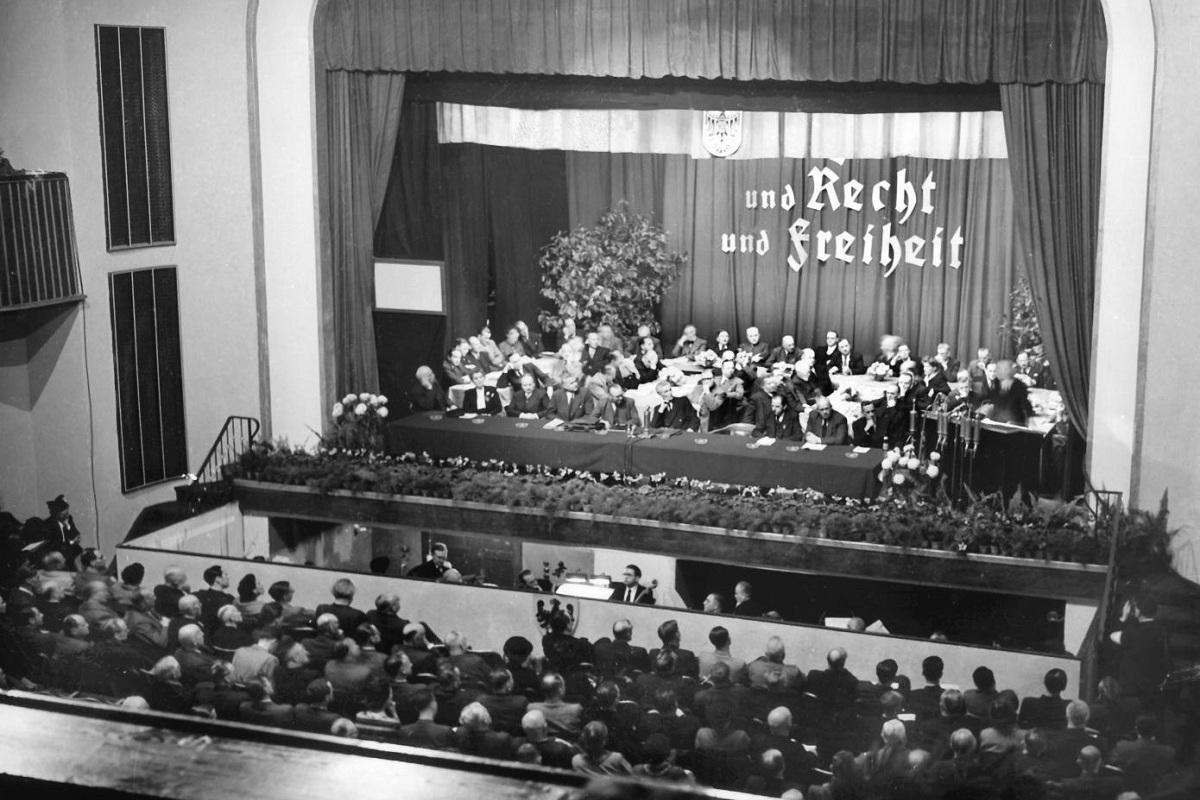 dpa - Bildarchiv
dpa - Bildarchiv
 ACDP / www.kas.de
ACDP / www.kas.de
 dpa - Bildarchiv
dpa - Bildarchiv


The “German economic miracle” would not have been possible without securing internal social peace. Legislation on co-determination in the steel and coal industry and on capital formation for employees, burden sharing, social housing construction, child benefit, the Green Plan for agriculture and dynamically shaping the social security pension became anchor points of the Federal Republic of Germany’s renowned welfare system. For the first time in Germany, social policy was continually and consistently pursued as structural policy.
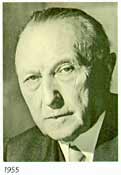
In the 1957 Bundestag elections, the CDU/CSU, with Adenauer as leading candidate gained the absolute majority of votes (50.2%) – probably an unprecedented success. A shadow of uncertainty loomed over Adenauer’s third chancellorship, however. A change in the global political climate, caused by the USA focusing its priories elsewhere, intensified Soviet pressure on Berlin (Berlin Ultimatum and Three-State Theory). Domestic politics was influenced by the struggle for a “successor” to the “old”. A historic step was taken with the political link between Germany and France that built on Adenauer’s friendship with de Gaulle (first meeting 1958). Meanwhile, German domestic policy had hit rock bottom.
Bronze plaque with Adenauer and De Gaulle
The bronze plaque on the corner of Tiergartenstraße and Klingelhöferstraße in Berlin was unveiled on 23 January 2003 by French President Jacques Chirac in the presence of German Chancellor Gerhard Schröder and his predecessor, Helmut Kohl.
Photo © Konrad-Adenauer-Stiftung e. V. / Henning Lüders
The occasion was the 40th anniversary of the signing of the Élysée Treaty by Charles de Gaulle and Konrad Adenauer, marking the reconciliation between the formerly hostile nations. The artwork, comprising a high relief of the two statesmen’s upper bodies with an inscription panel beneath, was created by the sculptor Chantal de la Chauvinière-Riant.
The building of the Berlin Wall on 13 August 1961, a few weeks prior to the fourth Bundestag election, seemed to reinforce the division of Germany over the long-term. Once again elected Chancellor of the CDU/CSU-FDP coalition in 1961, it was agreed that he would step down in the middle of the legislative period.
Respected Statesman
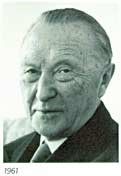
From the late 1950s, Adenauer spent most of his summer vacation in Villa La Collina, an estate in Cadenabbia on the Western shores of Lake Como in Italy. Although the Federal Chancellor was officially on vacation there, business naturally continued.
High-ranking visitors from politics and business were in attendance, there were telephone calls and correspondence, but there also many games of bowls.
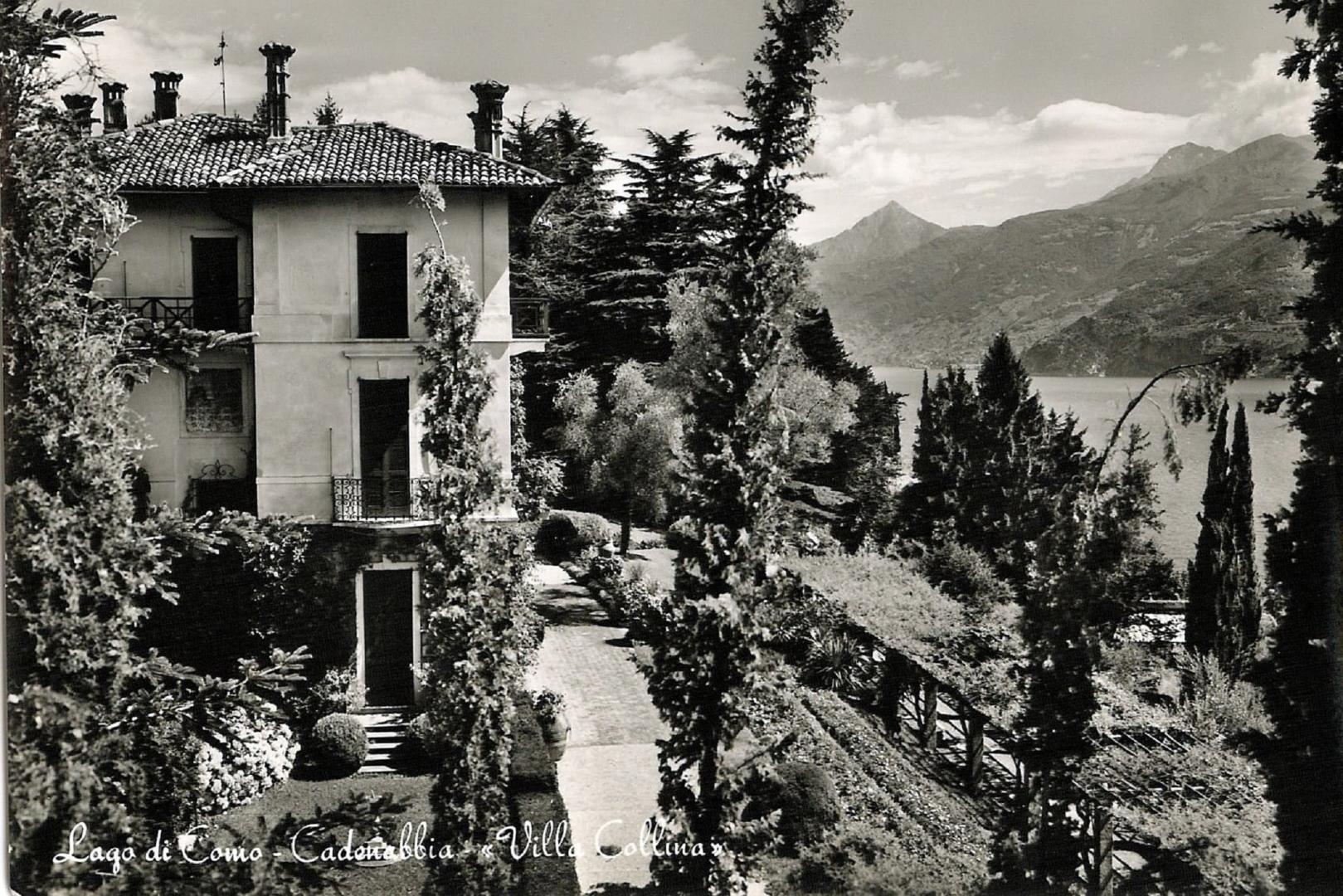 KAS
KAS
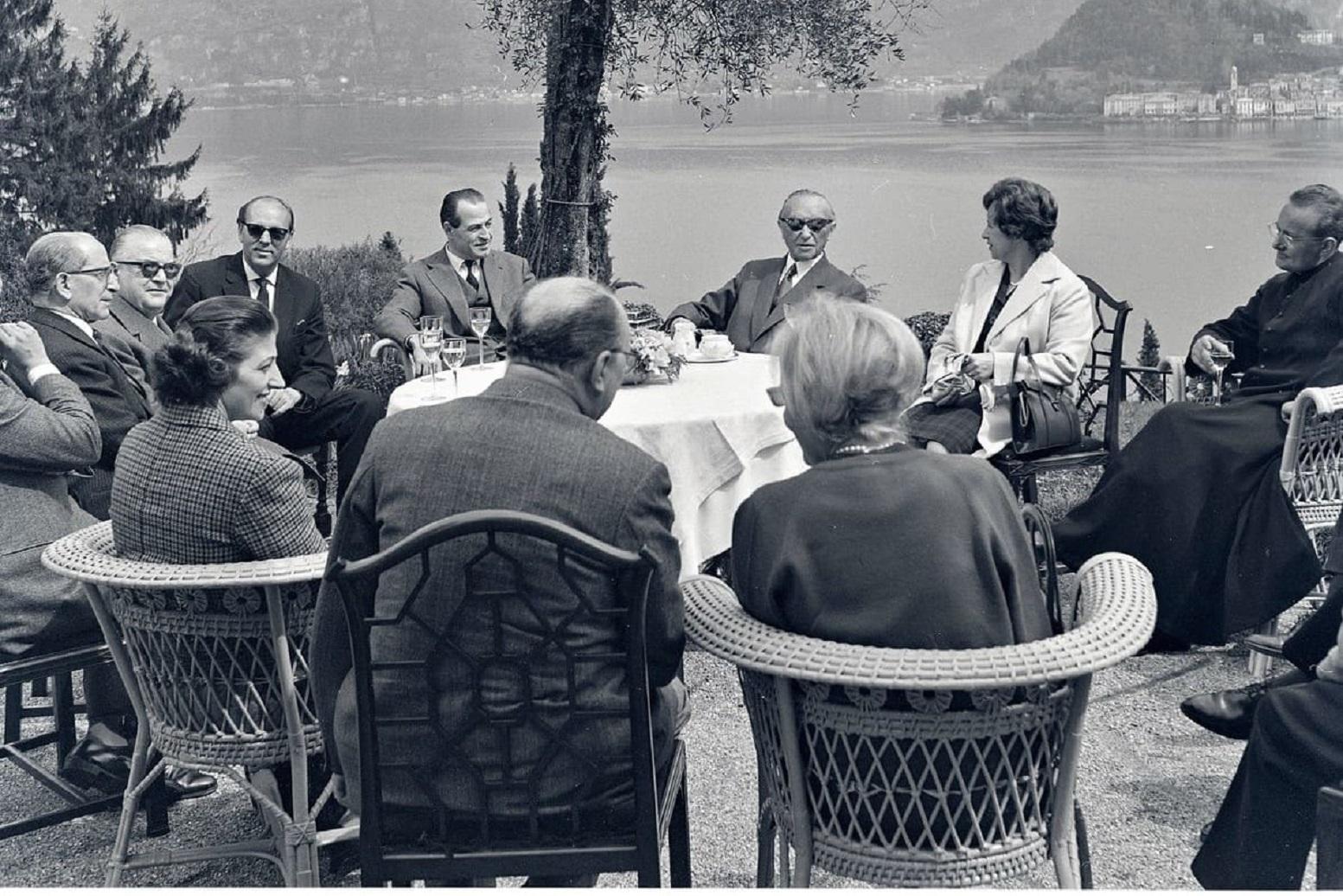 KAS
KAS
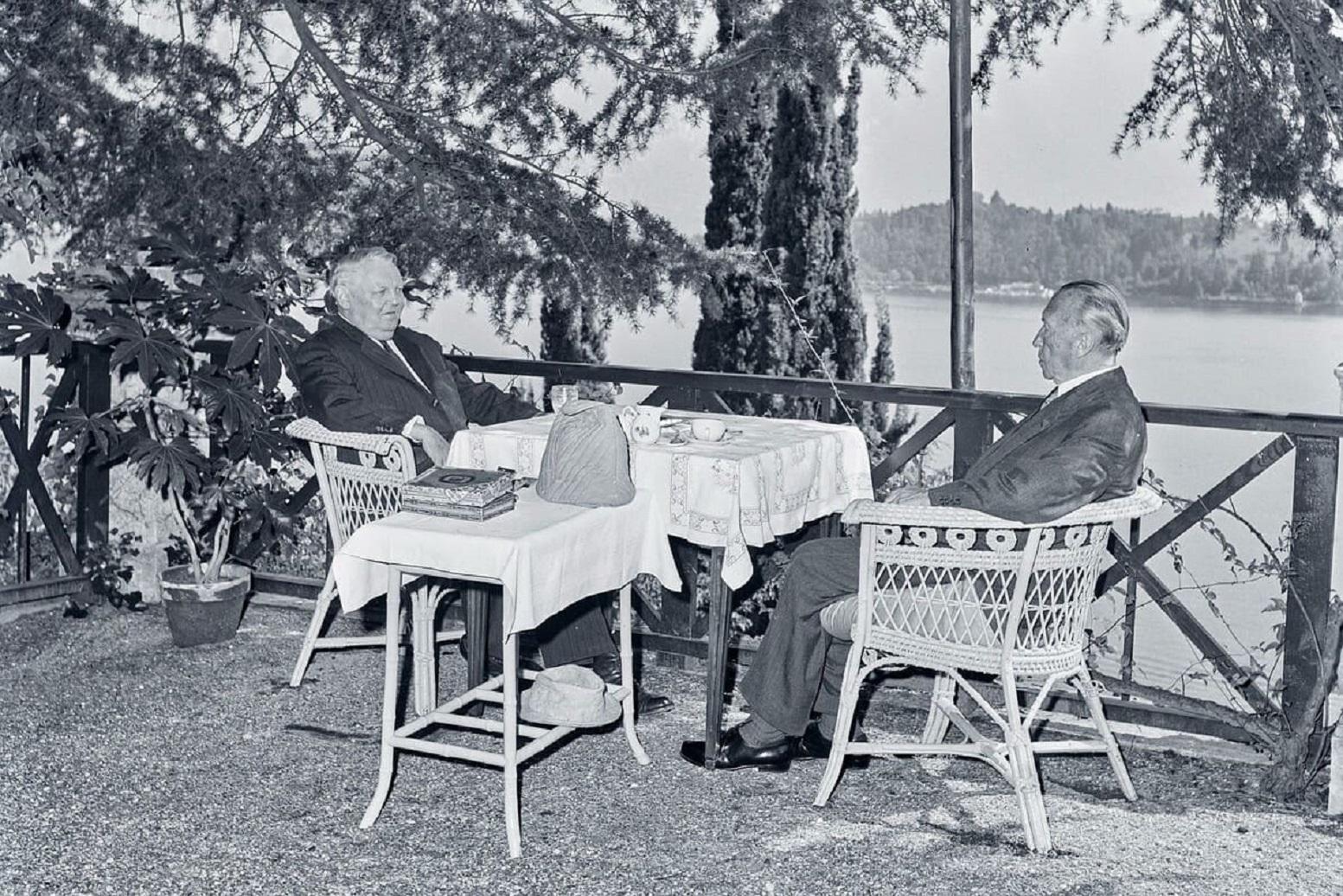 KAS
KAS
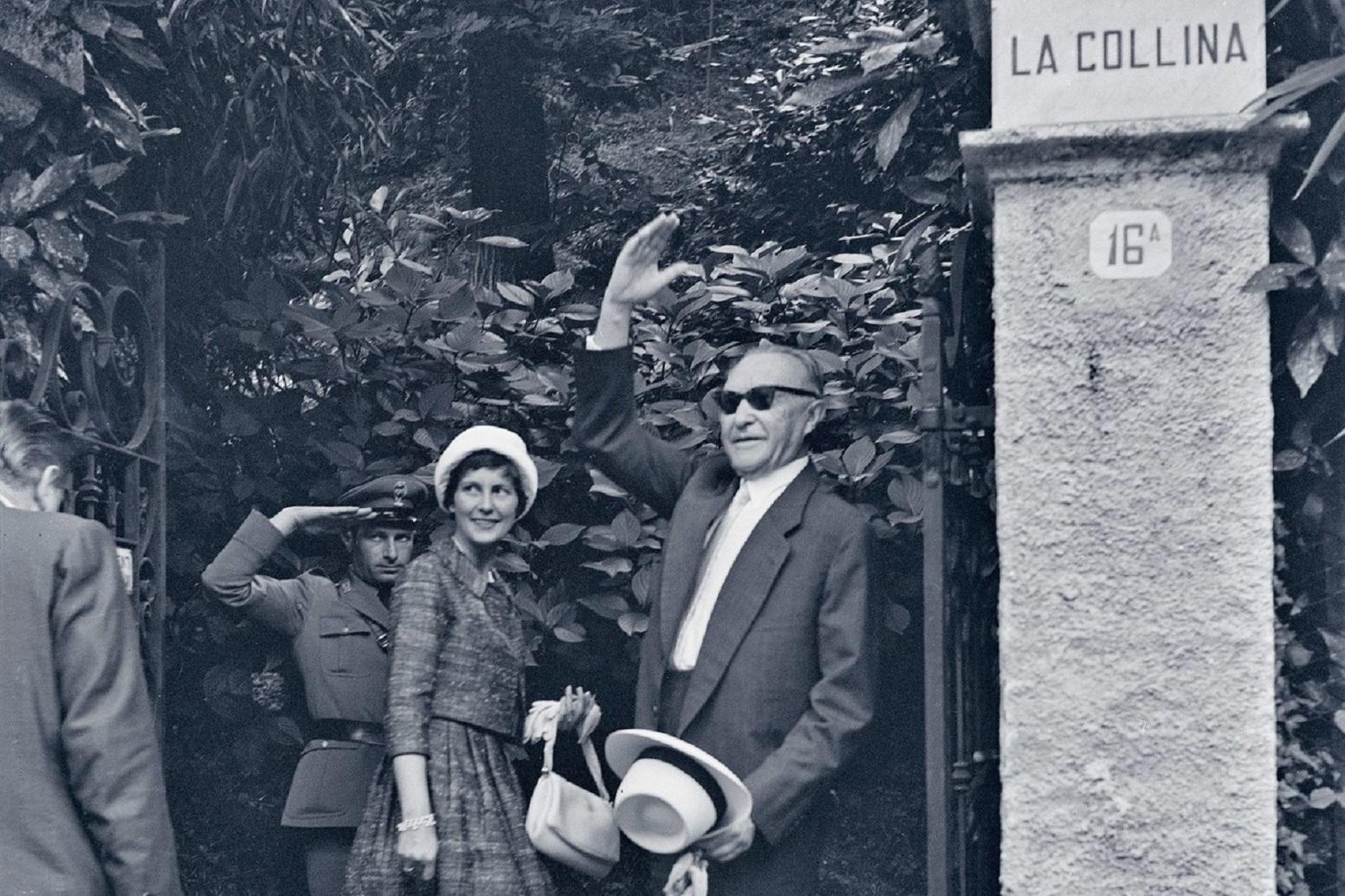 KAS
KAS
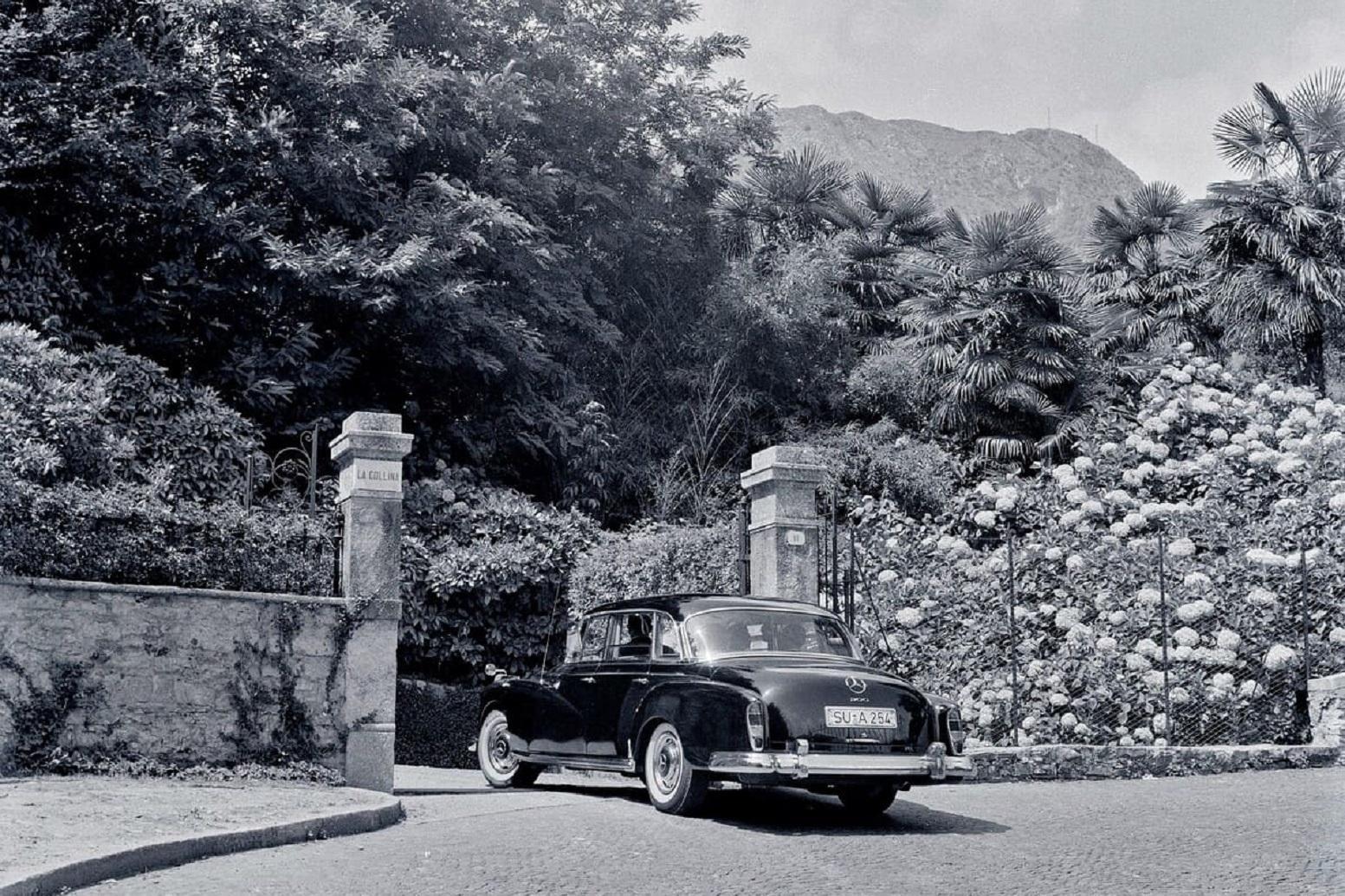 KAS
KAS
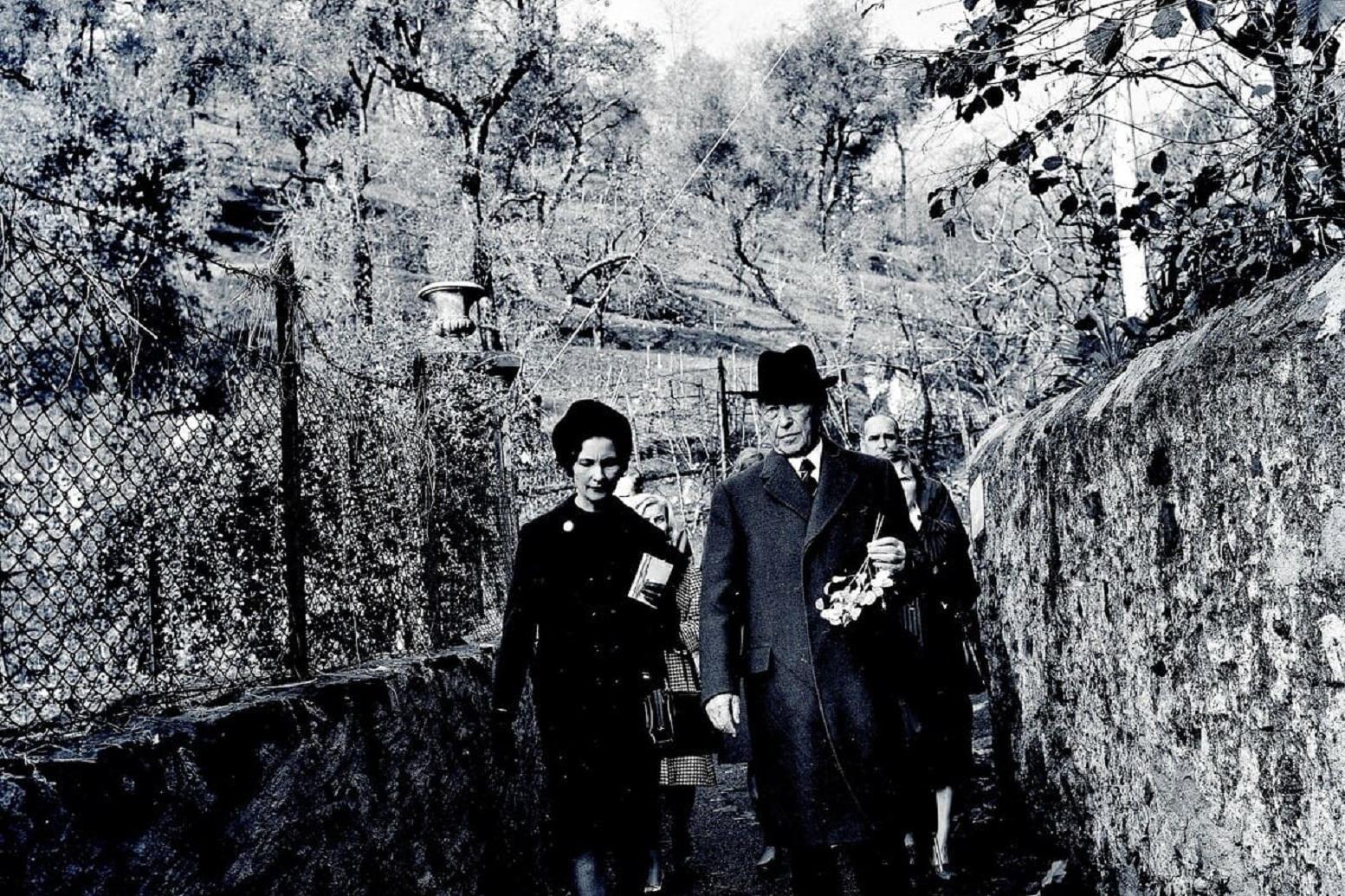 KAS
KAS
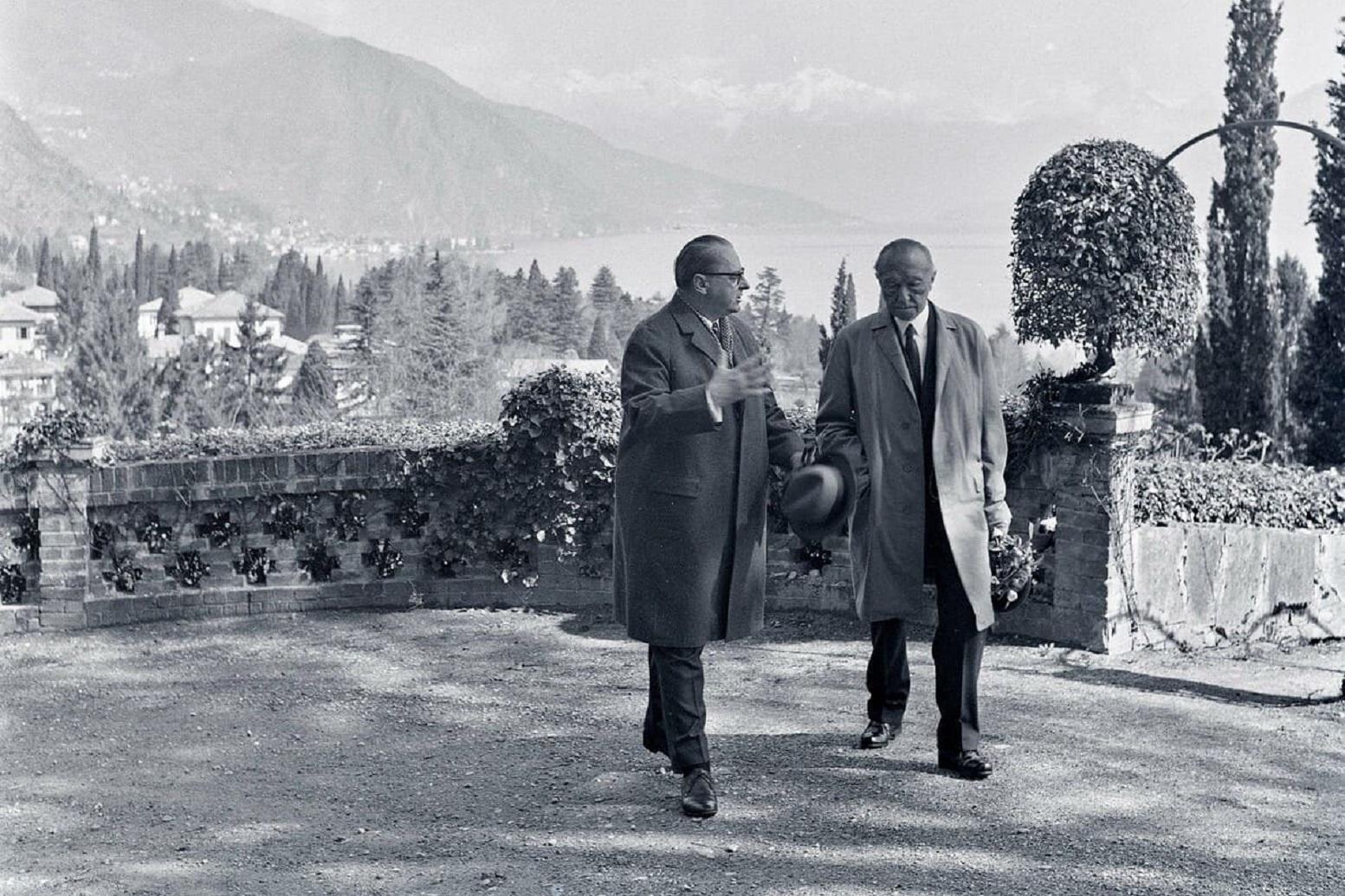 KAS
KAS
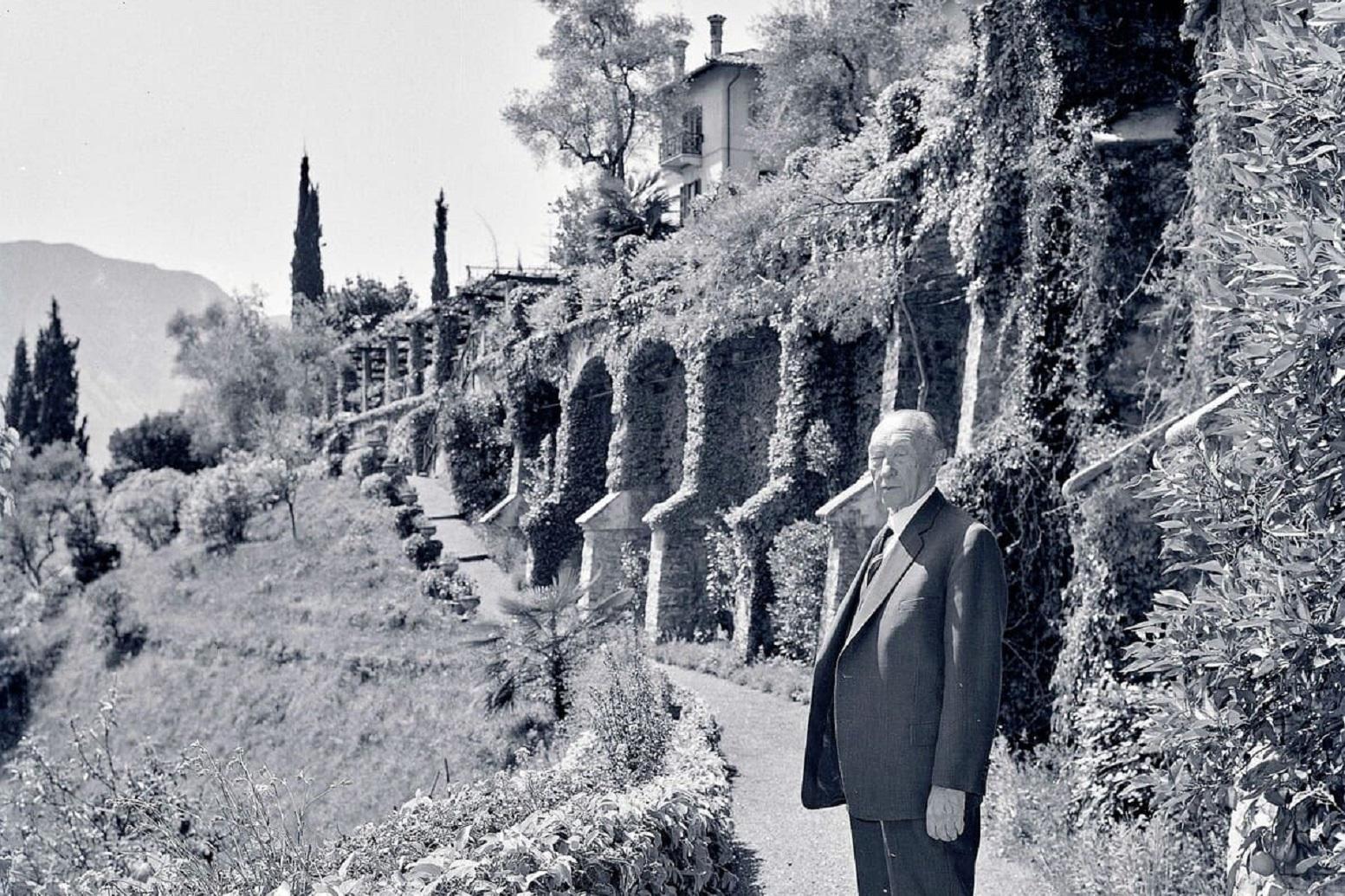 KAS
KAS
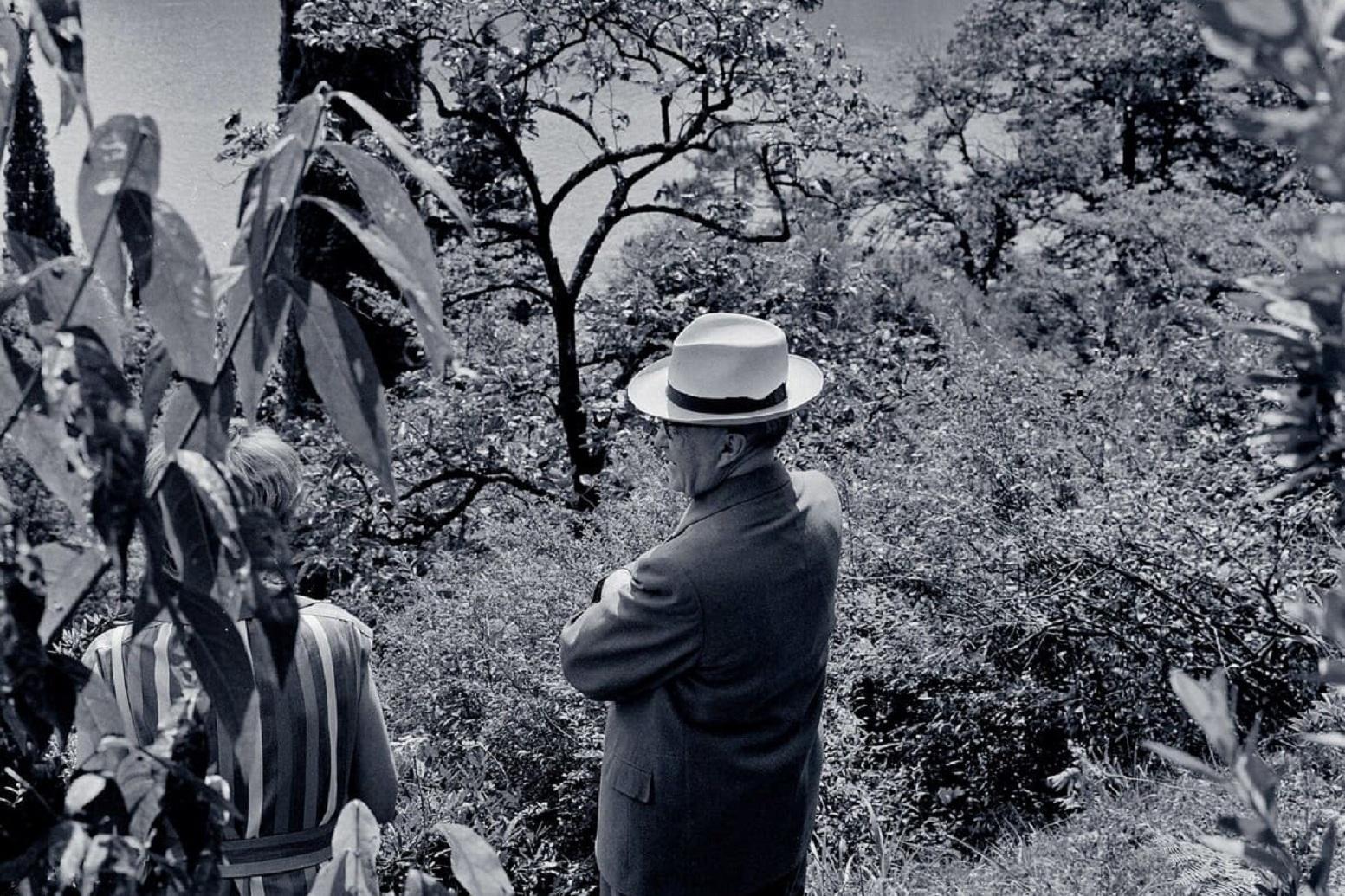 KAS
KAS
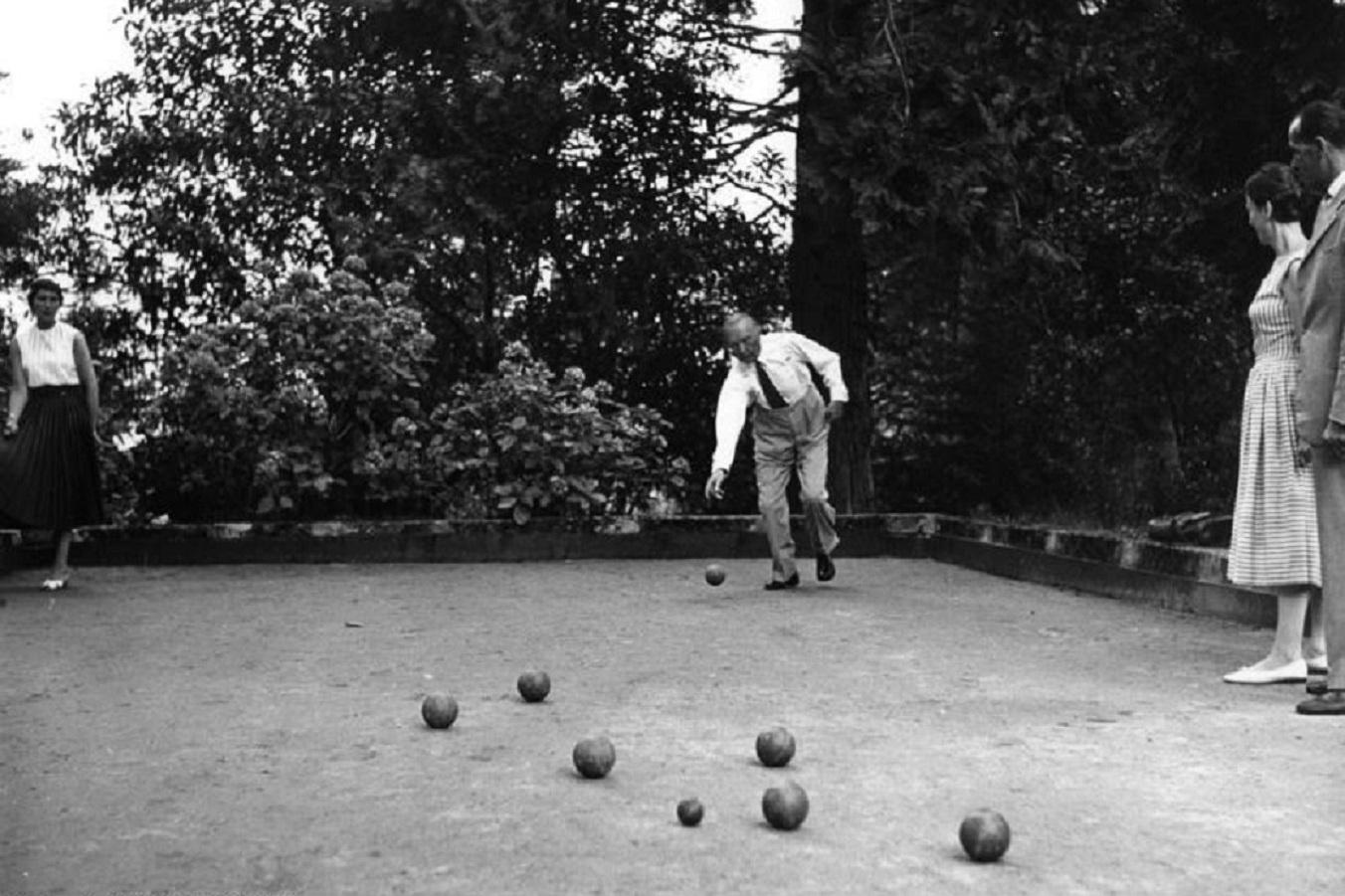 Bundesarchiv, B 145 Bild-F005917-0006 / Unterberg, Rolf / CC-BY-SA 3.0, via Wikimedia Commons
Bundesarchiv, B 145 Bild-F005917-0006 / Unterberg, Rolf / CC-BY-SA 3.0, via Wikimedia Commons
 KAS
KAS
 KAS
KAS
 KAS
KAS
 KAS
KAS
 KAS
KAS
 KAS
KAS
 KAS
KAS
 KAS
KAS
 KAS
KAS
 Bundesarchiv, B 145 Bild-F005917-0006 / Unterberg, Rolf / CC-BY-SA 3.0, via Wikimedia Commons
Bundesarchiv, B 145 Bild-F005917-0006 / Unterberg, Rolf / CC-BY-SA 3.0, via Wikimedia Commons










The estate has been in the possession of the Konrad-Adenauer-Stiftung since 1977. This was part of cultural heritage preservation, but, to a no lesser degree, an opportunity to continue working in the spirit of Konrad Adenauer in a place that, like scarcely any other, enables inner reflection and the intensity of joint discussion.
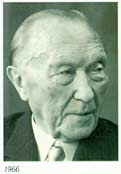
As the world war generations gave way to the children that rebuilt Europe, Adenauer lost his appeal. In 1966, he also resigned from this office as Federal Chairman of the CDU. His final political success was in 1963 with the signing of a Franco-German treaty, which, beyond focusing on cooperation between the two neighbouring states, pointed towards Europe as the major objective of Adenauer’s policy.
When he died on 19 April 1967, aged 91, he was honoured around the world as a statesman to whom Germans in the Federal Republic owed their freedom, prosperity and social security.
Adenauer Head Cast
The bronze head cast, on loan from the Adenauer family, was installed in front of the Konrad Adenauer Foundation’s Academy on 1 April 2022 on Tiergartenstraße in Berlin and officially unveiled on 11 May 2022 in the presence of the artist, Hubertus von Pilgrim.
Photo © Konrad-Adenauer-Stiftung e. V. / Katharina Haack
It is a second cast of the Adenauer head, the original of which has stood in Bonn since 1982. The monumental head, symbolising a powerful mind, rises only slightly above the ground, allowing passers-by to meet the founding father of our democracy at eye level. The back of the head is adorned with reliefs that together create a symbolic portrayal of Adenauer’s life.
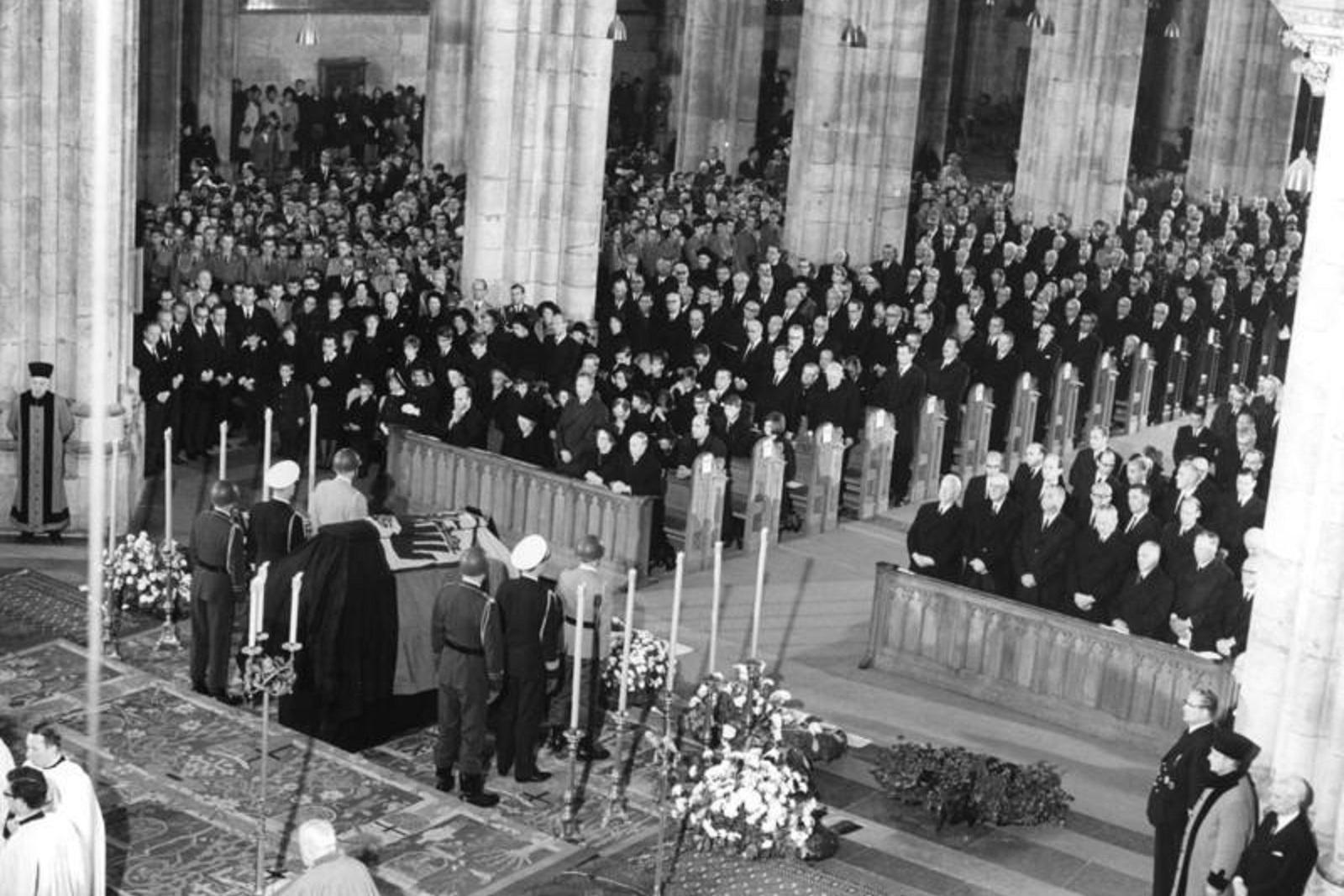 Bundesarchiv, B 145 Bild-F024568-0014 / Engelbert Reineke / CC-BY-SA 3.0, via Wikimedia Commons
Bundesarchiv, B 145 Bild-F024568-0014 / Engelbert Reineke / CC-BY-SA 3.0, via Wikimedia Commons
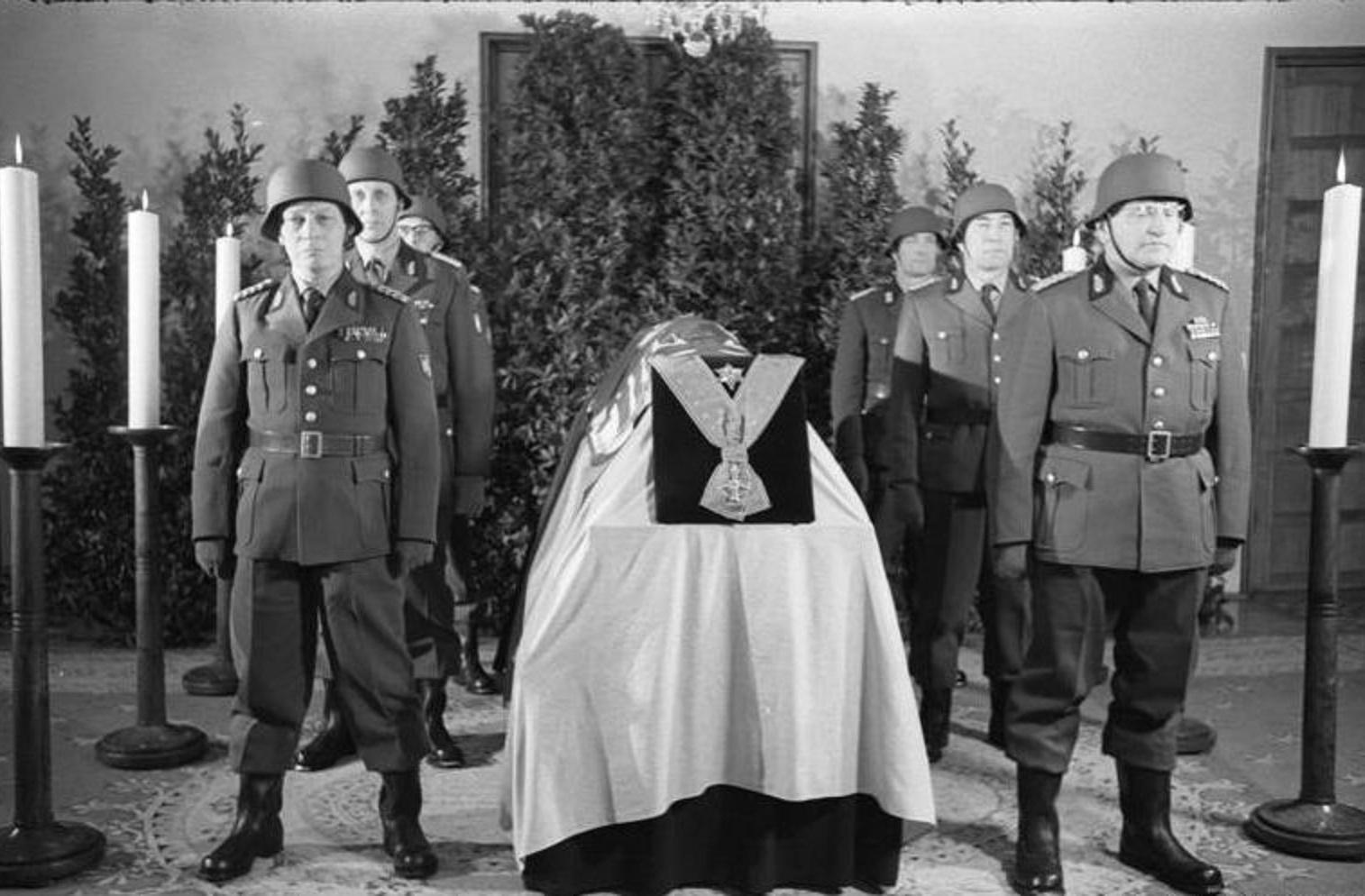 Bundesarchiv, Bild 173-1201 / Wolf, Helmut J. / CC-BY-SA 3.0, via Wikimedia Commons
Bundesarchiv, Bild 173-1201 / Wolf, Helmut J. / CC-BY-SA 3.0, via Wikimedia Commons
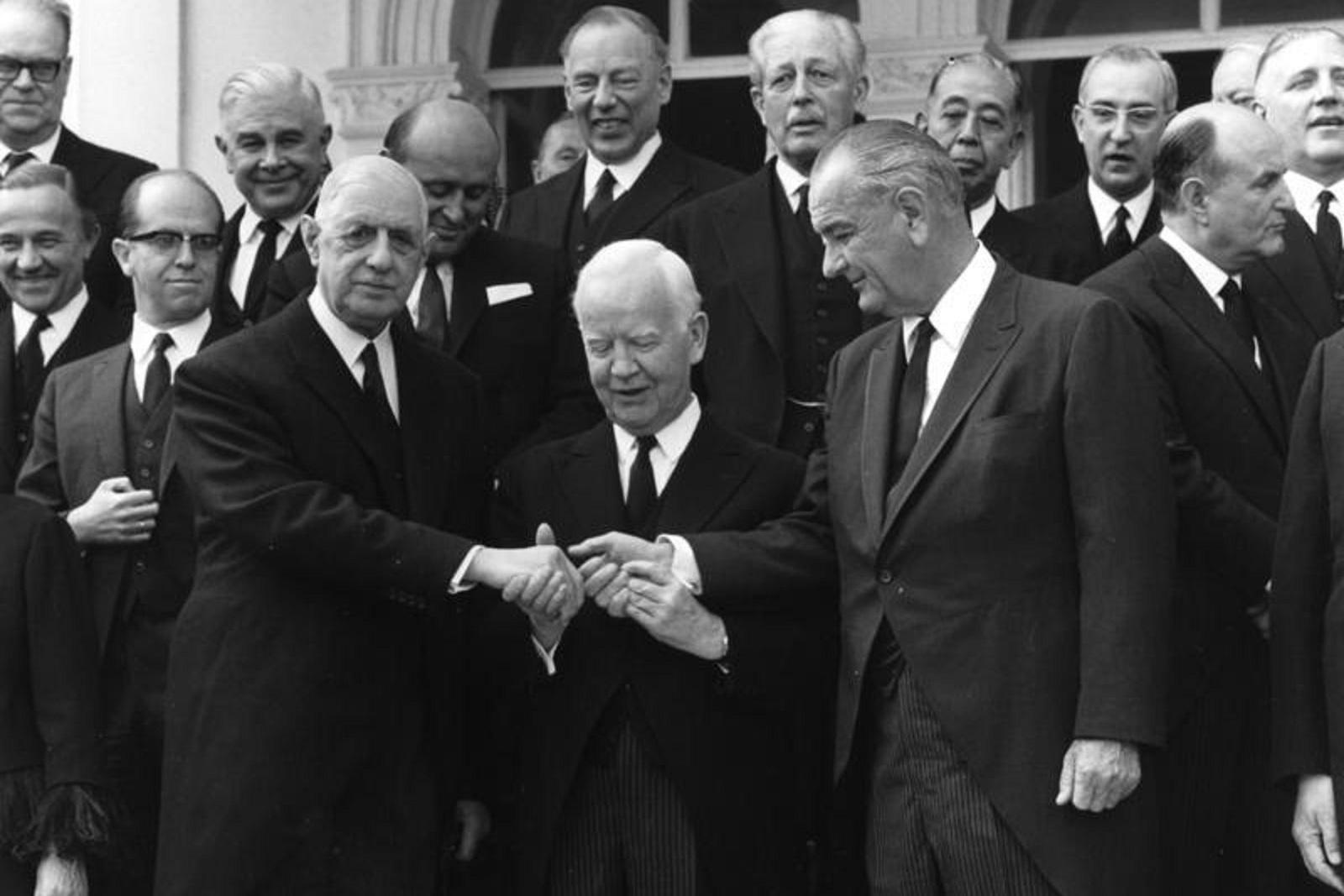 Bundesarchiv, B 145 Bild-F024624-0004 / Gräfingholt, Detlef / CC-BY-SA 3.0, via Wikimedia Commons
Bundesarchiv, B 145 Bild-F024624-0004 / Gräfingholt, Detlef / CC-BY-SA 3.0, via Wikimedia Commons
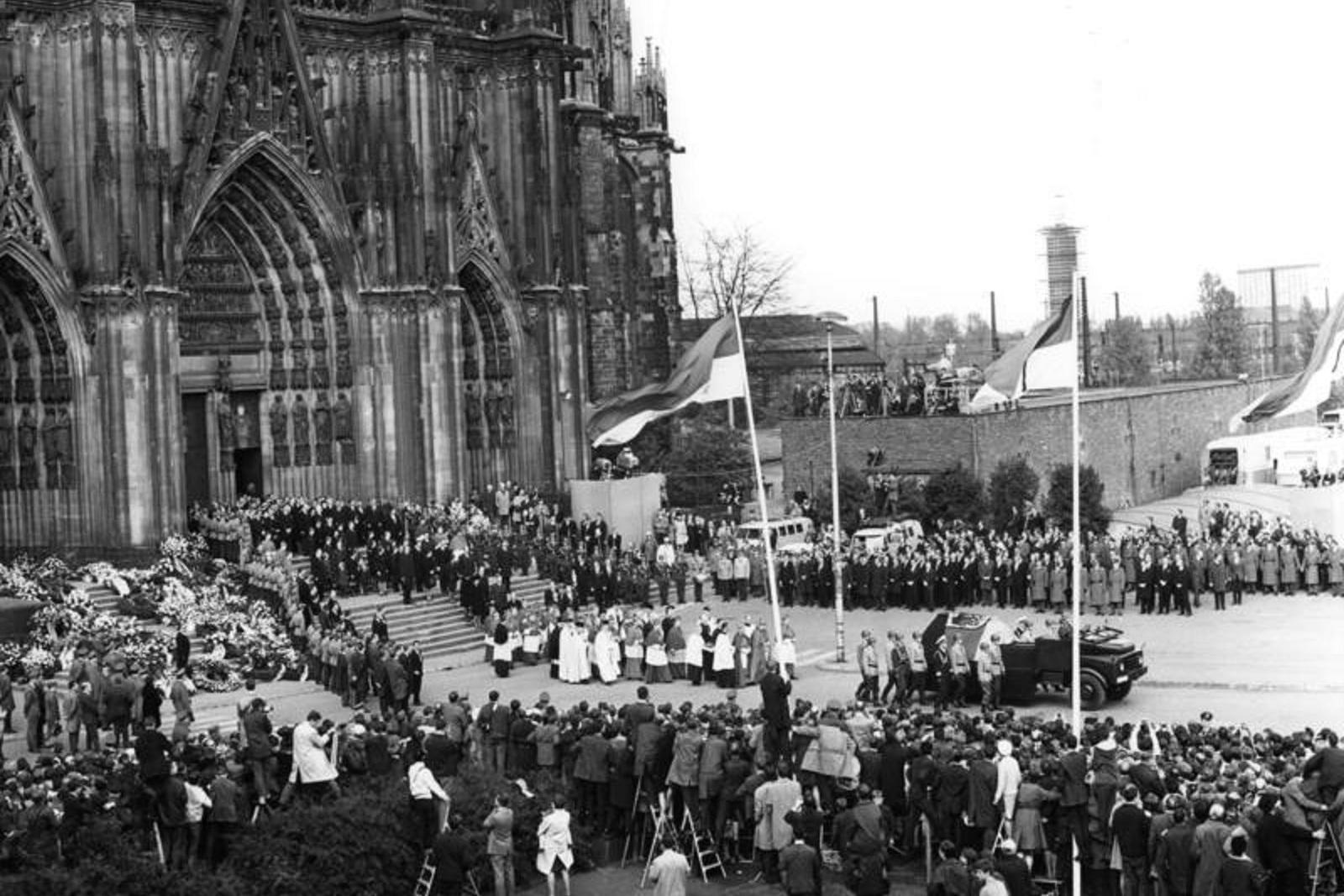 Bundesarchiv, B 145 Bild-F024648-0002 / Wegmann, Ludwig / CC-BY-SA 3.0, via Wikimedia Commons
Bundesarchiv, B 145 Bild-F024648-0002 / Wegmann, Ludwig / CC-BY-SA 3.0, via Wikimedia Commons
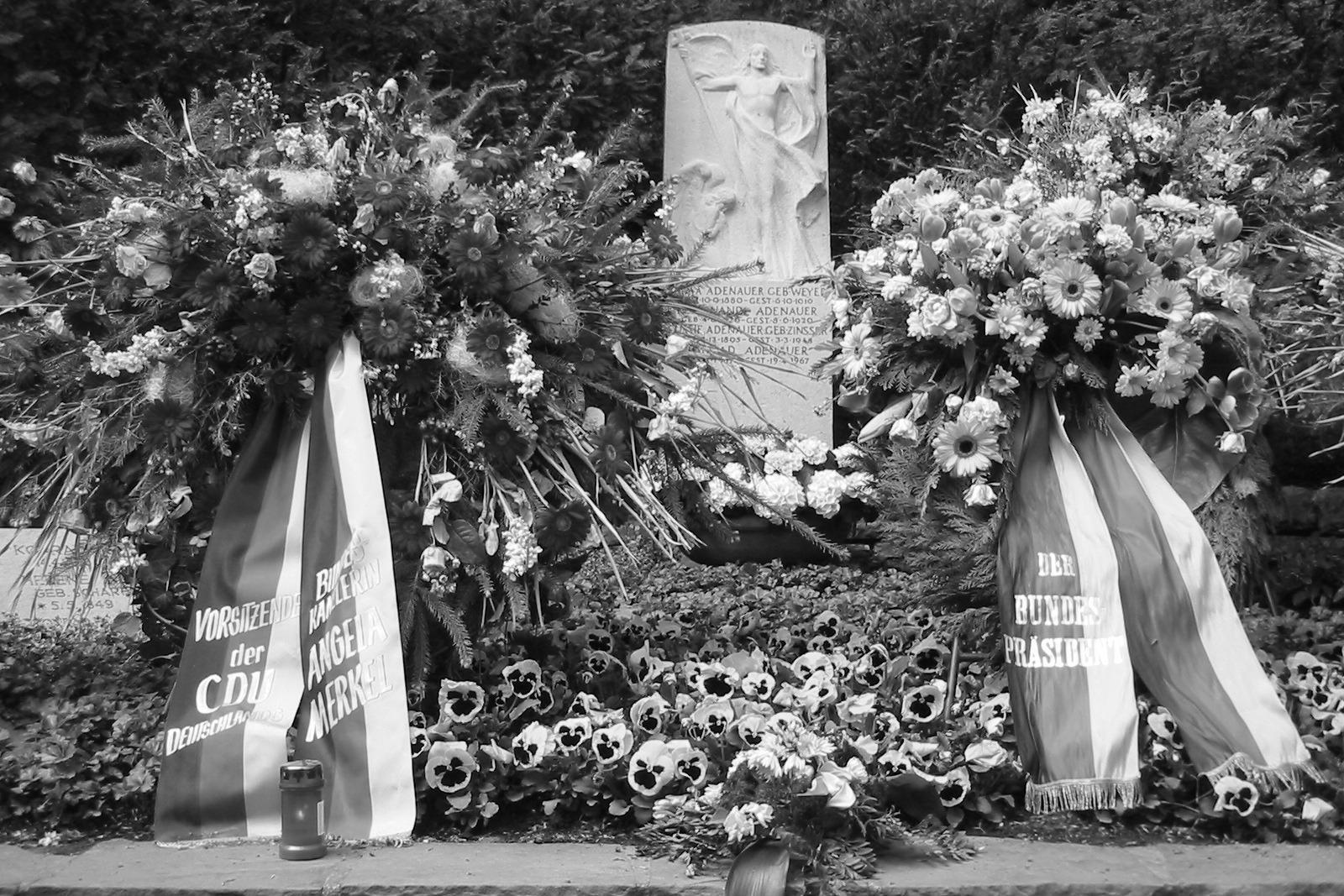 DieLachendeMehrheit / CC0, via Wikimedia Commons
DieLachendeMehrheit / CC0, via Wikimedia Commons
 Bundesarchiv, B 145 Bild-F024568-0014 / Engelbert Reineke / CC-BY-SA 3.0, via Wikimedia Commons
Bundesarchiv, B 145 Bild-F024568-0014 / Engelbert Reineke / CC-BY-SA 3.0, via Wikimedia Commons
 Bundesarchiv, Bild 173-1201 / Wolf, Helmut J. / CC-BY-SA 3.0, via Wikimedia Commons
Bundesarchiv, Bild 173-1201 / Wolf, Helmut J. / CC-BY-SA 3.0, via Wikimedia Commons
 Bundesarchiv, B 145 Bild-F024624-0004 / Gräfingholt, Detlef / CC-BY-SA 3.0, via Wikimedia Commons
Bundesarchiv, B 145 Bild-F024624-0004 / Gräfingholt, Detlef / CC-BY-SA 3.0, via Wikimedia Commons
 Bundesarchiv, B 145 Bild-F024648-0002 / Wegmann, Ludwig / CC-BY-SA 3.0, via Wikimedia Commons
Bundesarchiv, B 145 Bild-F024648-0002 / Wegmann, Ludwig / CC-BY-SA 3.0, via Wikimedia Commons
 DieLachendeMehrheit / CC0, via Wikimedia Commons
DieLachendeMehrheit / CC0, via Wikimedia Commons





Adenauer is buried in Rhöndorf. A foundation has turned his home into a museum and research centre. His memoirs, the first volume of which was published in 1965, and his edited correspondence are first-class historical sources.
An Overview of Important Biographical Data
Tabular curriculum vitae of Konrad Adenauer
| 05/01/1876 | born in Cologne |
| 1894 | A-levels at the Apostelgymnasium Cologne |
| 1894–1897 | law studies in Freiburg, Munich and Bonn |
| 1897 | First State Examination in Law, preparatory service period |
| 1901 | Second State Examination in Law |
| 1903–1906 | Assessor at the public prosecutor’s office in Cologne, employment in a law firm, Assistant Judge at Cologne District Court |
| 1906–1909 | Assigned attorney of the City of Cologne |
| 1909–1917 | First Assigned Attorney and Deputy Lord Mayor of the City of Cologne |
| 1917–1933 | Lord Mayor of Cologne |
| 1921–1933 | President of the Prussian Council of State |
| 1933 | dismissal as Lord Mayor by the National Socialists |
| 1933–1934 | residence at the Benedictine abbey Maria Laach/Eifel |
| 1934–1935 | residence at Neubabelsberg |
| seit 1935 | residence at Rhöndorf |
| 04.05.1945 | Reappointment as Lord Mayer of Cologne by the occupation power and renewed dismissal |
| 22/01/1946 | Election in Herford as preliminary Chairman of the CDU in the British Zone |
| 01/03/1946 | Election as Chairman of the CDU in the British Zone in Neheim-Hüsten |
| 1946–1950 | Member of the Landtag in North Rhine-Westphalia |
| 1946–1949 | Election as Chairman of the CDU in the British Zone in Neheim-Hüsten |
| 1948–1949 | President of the Parliamentary Council |
| 1949–1963 | First Federal Chancellor of the Federal Republic of Germany |
| 1949–1967 | Member of the Bundestag (MP) |
| 1950–1966 | Federal Chairman of the CDU |
| 1951–1955 | Federal Foreign Minister |
| 1966–1967 | Honorary Chairman of the CDU |
| 19.04.1967 | died in Rhöndorf, Bad Honnef |




